#is that forcing something on her? or is that critically engaging with her art?
Explore tagged Tumblr posts
Text
A Duet of Fire and Fate
Part Three | Series Masterlist

Summary: tensions between Aemond and the pianist reach boiling point | Word Count: 4.6k~ | Warnings: smut, semi-public sex, forced proximity, mummy issues

There was a sense of unease about being awake at this time. An early riser, Aemond was, but even this was pushing it for him as he sat on the creaky bus, having to listen to the way plastic and metal jolted his bones with every little divot in the road, only amplifying the disquiet that was equally happening inside his head.
Glancing at his watch, the gold hands mocked him once more. 5:49 in the morning.
That morning, Alys had made her stance painfully clear: their encounters had to end. She seemed to realise that their relationship had become merely a means to an end, a way for him to escape his pressures. The implication that she felt used weighed heavily on Aemond, even though she framed her decision in practical terms.
"You need to focus on your music, not me," she had said, her voice firm, leaving no room for argument. It was a logical decision, one that should make perfect sense to a disciplined musician like him. Yet, as he turned her words over in his mind, they struck a dissonant chord.
The thought of facing Otto's incessant messages about organising a meticulous solo practice session, only to nitpick at his every perceived flaw, was unbearable. So, Aemond sought refuge in the numbing scroll of social media, anything to ward off the encroaching silence of the apartment.
As his thumb flicked mechanically across the screen, a thought struck him, a reckless impulse that had been lurking in the back of his mind. He paused, his heart rate ticking upward with the audacity of what he was about to do. Swiping out of the mundane updates and into the search bar, he typed her name, the pianist who had so effortlessly invaded his thoughts and challenged his perspectives.
Her profile wasn’t hard to find, her public persona was as vibrant and engaging as her performances. There she was, in photos and tagged videos, her presence as dynamic online as it was in person. Each post, each snippet of her life and art, pulled him in deeper, her world unfolding before him through the glow of his phone screen.
The more he watched, the more he realised how much she had begun to permeate his thoughts, challenging not just his musical ideals but the very way he viewed his art. It wasn’t just professional curiosity, it was something more, something deeper. A connection he hadn’t anticipated, one he wasn’t sure he wanted, but also one he couldn’t seem to deny.
He thought perhaps a nice, hot shower would clear his thoughts with heavy ribbons of steam, near-scalding his pale skin as droplets of water slid off his body. His hair clung to his neck, falling in strips around his face as he stared at his reflection on the drain cover. Sometimes he could not bear to even look at himself.
But even with his eyelids pressed tightly shut, he did not know peace.
He was sixteen again, standing on the stage of a packed auditorium. The applause had faded, and he was left alone with Otto, whose presence loomed larger than the praise had ever felt. Otto's face was stern, his eyes dissecting not just the performance, but Aemond himself. "That was adequate, Aemond, but only just," Otto had said, his voice cold and precise. "Your bowing was sloppy in the second movement. You must control every motion, every emotion." Aemond's hands had trembled with a mix of exertion and suppressed anger. He had poured his heart into that performance, felt every note resonate within him, but Otto saw only flaws. "Control, always control," Aemond muttered under his breath, his grip tightening on the neck of his cello. Otto had caught the muttered defiance. "What was that?" he snapped, stepping closer. "If you have something to say, speak clearly, boy." "Nothing," Aemond replied, his voice low, but inside, a storm was brewing. Otto’s relentless criticism after every performance, his inability to see anything but the mistakes, Aemond felt like a vessel about to burst. That night, back at the music academy, in the solitude of the practice room, Aemond stared at his cello. The beautiful instrument, which had always been his voice, now felt like a chain. In a moment of blinding rage, a desire to break free from Otto’s relentless grip, he did the unthinkable. With a shout that echoed through the empty room, Aemond lifted his cello and smashed it against the floor. Wood splintered, strings snapped, a harsh, discordant noise that was the antithesis of everything he had been taught to produce. The destruction was quick, but the silence that followed was heavy, filled with the weight of what he had done. But didn’t regret it one bit.
Aemond opened his eyes, the memory leaving a bitter taste in his mouth. He had eventually replaced the cello, and Otto had never mentioned the incident, assuming it had been an accident. But something inside Aemond had changed that day. The act of destruction, though regrettable, had been his first real rebellion, his first step toward finding his own voice amidst the oppressive expectations placed upon him.
Now, years later, as he considered reaching out to the pianist, he realised he was standing at another crossroads. Would he continue to conform to the stringent demands of his classical training, or would he dare to explore the emotional depth that she so effortlessly embodied in her music?
Stood there, beneath the stream of water that had now ran cold, Aemond felt the old, familiar stirrings of rebellion. This time, however, it wasn't about destruction but about discovery. Maybe, just maybe, it was time to smash through the invisible barriers he had erected around his music and his heart.

The loud chattering and messy runs of various instruments made it difficult to concentrate. She found herself blinking hard and tiredly, willing the exhaustion away. Lyonel Strong had yet to arrive to conduct today's practice, and so everyone had taken it as an excuse to not practise at all.
"Can you believe this?" Jason called out from across the room, his voice tinged with annoyance. He was leaning against the wall, his violin hanging loosely in his hand. "Lyonel's late again. We could have started at least half an hour ago."
She sighed, running a hand through her hair. "I know, Jason. But complaining isn't going to make him appear any faster."
Maris, with her fiery red hair and a perpetual scowl, was plucking at her strings, each note more discordant than the last. "It's not just Lyonel," she snapped. "Half of you can't even play your parts right. Couldn't organise a piss up in a brewery.”
The others chimed in, their voices overlapping in a cacophony of complaints and criticisms. Jason and Maris continued to bicker, their frustration with each other and the situation palpable. She tried to mediate, her soft voice lost in the din, while others muttered under their breath or joined in the argument.
The pianist tuned out the noise, focusing instead on marking her music sheets. She meticulously made notes, adding small annotations to help guide her through the piece. The process was calming, a small island of order in the midst of the chaos around her. She could hear snippets of the ongoing argument, but she chose to ignore them, her mind drifting.
Their band was a far cry from Aemond's. His ensemble operated with a precision and unity that seemed almost unattainable for her group. Every member of his band knew their role, their place, and they worked together seamlessly. In contrast, her band felt like a collection of individuals, each with their own agenda, their own frustrations.
When Lyonel eventually decided to join them, having had his fill of several espressos, their practice could finally begin. The tension lingered, a constant reminder of the disunity that plagued them. As she played, her thoughts drifted to the upcoming competition, the inevitable clash with Aemond's band. She knew they needed to be better, to be more cohesive, if they were going to stand a chance.
"Can I have a word?" Lyonel asked authoritatively as she was packing her things away with practised efficiency. The room had cleared, others wanting to escape the confining claws of his teachings.
She nodded, trying to mask the fatigue she felt. "Of course."
Lyonel glanced around the now-empty room before speaking. "I wanted to talk to you about your solo performance."
She had known for a while that she would have a solo, but the way he said it now made her stomach twist with unease. "Yes, sir?"
Lyonel studied her for a moment longer, then sighed, his stern demeanour slipping. "Look, I know our chemistry as a band isn't perfect," he admitted, his voice softer. "But that’s exactly why we need you to shine. Your solo can elevate the entire performance. It can make up for the lack of cohesion."
She bit her lip, feeling a mix of frustration and resignation. "I understand the importance of my solo, but wouldn’t it be better if we worked on our chemistry as a band? If we played better together, maybe the pressure wouldn’t have to fall entirely on one person."
Lyonel’s expression hardened again, though not unkindly. "I know it’s not fair. But with the time we have left, we need to play to our strengths. And right now, you are our strength."
She wished he would address the root issue instead of putting all the pressure on her, but she knew better than to argue further. "I'll do my best," she said finally.
Lyonel placed a hand on her shoulder, a rare gesture of support. "I know you will. Just remember, it’s not just about you out there. It’s about all of us. We’re counting on you."
With that, he turned and walked away, leaving her alone with her thoughts. She stood there for a moment, letting his words sink in. The pressure was immense, but so was the opportunity.
“Music is in your blood, my dear.”
Memories of her family surfaced unbidden. Her father, a renowned classical musician, had always been a looming figure in her life. His talent and success were legendary, casting a long shadow over her own musical ambitions. Yet, despite his fame, he had left her mother for another woman within the same industry when she was still a child. The betrayal had torn their family apart.
Her mother, once supportive of her daughter's musical pursuits, had become bitter and resentful. The very sight of a piano seemed to deepen the rift between them. "You'll end up just like him," her mother would say, the words dripping with disdain. "Consumed by music and blind to everything else.”
Their relationship had deteriorated to the point where they barely spoke. Communication was limited to snotty texts, her mother’s disapproval seeping through every word. Her mother couldn't understand why she wanted to follow the same path that had destroyed their family.
On the other hand, her father would occasionally reach out, but his messages were infrequent and perfunctory. His busy schedule left little room for meaningful connection. When he did find time to call, his conversations were often laced with criticism.
She often found herself caught between two worlds, one that resented her passion and another that demanded perfection. She longed for approval, for a sense of belonging that seemed always just out of reach.
Her fingers hurt but she didn't care. She stood on stage, feeling like a million dollars, soaking in applause that rang in her ears, the first place medal cool against her chest. But as her eyes scanned the crowd, searching desperately for a familiar face, for her mother, she felt her stomach sink. Her heart pounded harder than it had during her performance, but for all the wrong reasons. The rush of victory, the adrenaline that should have been pumping through her veins, was rapidly replaced by a hollow feeling. She stepped off the stage, clinging to the hope that maybe her mother had just been late or stuck in traffic. Maybe she’d be waiting outside, apologising for missing the performance, but there nonetheless. She checked her phone, scrolling through her contacts until her mother’s name flashed on the screen. Her hands shook as she dialled. It rang. Once. Twice. Three times. Voicemail. The third call, the fifth, the eighth, it all blurred together as she wiped at her eyes. By the tenth attempt, her hands were trembling, and the high of winning was a distant memory. She dialled again, fighting back tears that threatened to spill over. When the voicemail beeped once more, she paused, then finally spoke, her voice breaking. "I won, Mum��” She stared at her phone for a long moment before slipping it back into her bag. The title, the first-place medal, they felt like nothing now.
Packing up her sheet music, she made her way towards the practice rooms, and as if on cue, a text buzzed in her pocket. With a sigh, she opened the message from her mother, bracing herself for the usual criticism.
Your father mentioned you have a competition coming up.
She rolled her eyes. As if her mother had expected her to bite when that is the bait.
No ‘how are you’ or ‘how is music school’. No. It was always about how she had to not follow the same path as her father and not let music consume her like it had him.
Whenever her thoughts drifted to him, she found herself sinking into confusion. However distant he was, she still craved his approval. Longing for him to say he was proud of her. Just once.
She slipped through the doors with the hotheaded mindset that she would do better. Determined. But she halted when she heard the familiar whine of a delicate instrument she had come to know so well. If her shoes hadn’t squealed against the varnished, wooden floor, she wouldn’t have disturbed him from his practice. But like an animal primed for distractions, Aemond’s head whipped up from his cello, his expression hardening once he saw her.
“I have this room booked.”
She narrowed her eyes, her jaw tightening. "Funny, because I do too."
Aemond's lips pressed into a thin line, his annoyance palpable. "You must have made a mistake."
She shook her head, stepping further into the room. "No mistake. Maybe you're the one who needs to check the schedule.”
She slipped her bag off her shoulder, searching it with her back turned to him. Her hands shook with frustration, the build-up of the day lingering with fire in her blood. She froze when she stared at her blue tinted screen, seeing that somehow…
Double booked.
“You're not going to leave, are you,” Aemond muttered annoyed.
She turned to face him, an eyebrow raised. “Why should I? I have as much right to be here as you do.”
Aemond smirked, leaning casually against his cello. “Is that how you justify it? Riding on the coattails of your daddy’s fame?”
Her eyes narrowed. “Excuse me?”
“You know,” he continued, his voice dripping with condescension, “the big famous musician embroiled in scandal. Must be tough living in that shadow.”
Her jaw clenched. “You don’t know anything about my family.”
“Oh, but I do,” he said, setting aside his instrument to taking a step closer. “Everyone does. It’s quite the story, isn’t it? Daddy leaves Mummy for someone else in the industry. Must be quite the inspiration for your music. I knew I'd seen your surname around somewhere. Turns out it was the tabloids.”
Her hands tightened, her nostrils flaring with irritation.
“Aw, sore spot?” he taunted, enjoying the way her eyes flashed with anger.
She took a deep breath, trying to keep her composure. “You think you’re so much better than everyone else, don’t you?”
He shrugged nonchalantly. “Maybe I am.”
“That arrogance is going to be your downfall one day,” she shot back.
“And your baggage is going to be yours,” he replied smoothly.
Without warning, she stepped closer, their faces inches apart. “You want to talk about family baggage? Let’s talk about yours.”
Aemond’s eyes darkened. The smile, victoriously wiped from his face. “Careful.”
“Why? Can’t handle it?” she challenged. “Maybe you throw accusations of daddy issues because you have them yourself—”
“Watch it.”
“Or what? You’ll keep me from practising? You’ll sabotage me?” she retorted, stepping closer. “You're a fucking coward—”
The door to the practice room opened abruptly, and the sound of footsteps interrupted their heated exchange. Without thinking, Aemond grabbed her arm and pulled her into the storage room, shutting the door quietly behind them. They stood in the cramped space, their breaths mingling in the darkness.
The footsteps in the practice room slowed, followed by the unmistakable murmur of voices. Aemond stiffened, his body going rigid against hers, and for a split second, all he could smell was her perfume and feel the rapid fluttering of her heart against his chest. The weight of the voices hit him hard, and he recognised them immediately.
Otto.
And Lyonel.
His heart pounded harder now, not only from the closeness of her body, but of the two men outside the door.
Otto's voice carried through the thin walls. “I trust you’ve got a firm hand on your group.”
Lyonel made a noise of agreement, but there was a subtle edge to his tone. “They're a bit disjointed, but not as much as I hear yours are.”
Aemond’s jaw clenched. Neither of them dared to breathe too loudly, straining to hear the conversation outside, but the pressure between them, physical and emotional, was unbearable.
“That is none of your business,” Otto's voice was guarded. Icy.
Aemond’s breath hitched, and she felt the sharp intake of air against her ear, his frustration simmering just beneath the surface. His hand slid to brace himself against the wall beside her, his body pressing more firmly against hers not out of seeking comfort, but simply because he had no choice.
“Hmm, your grandson I hear is a bit of a wild card.”
“He’s difficult, but I’ve trained him for this. He just needs focus.”
The footsteps shifted, and for a moment it seemed like they were heading toward the door of the storage room. Her mouth opened but Aemond’s hand shot up, covering her mouth as he leaned in even closer. His eyes widened in silent warning.
Her pulse quickened.
"Your grandson is a good player," Lyonel said, a hint of frustration in his tone. "But from what I've seen, he’s too rigid. No room for improvisation. He might fall apart when things get unpredictable."
Aemond’s teeth clenched, his hand now gripping the edge of the shelf beside her. She could feel the tension vibrating off him, and she fought the urge to push him back and say something. But they couldn’t risk being heard.
“That’s why you’re counting on her, aren’t you?” Otto’s voice was quieter now, almost conspiratorial. “Your pianist, what’s her name again? She’s your only shot at taking the solo.”
Lyonel chuckled softly. “She’s going to win it for us. I have no doubt about that.”
The footsteps began to fade, the two continuing to speak about where the final performance would be held, and she heard the distant click of the door closing. Aemond finally released her, but the tension between them was far from gone. The room seemed smaller, the air heavier with the weight of everything unsaid.
She pushed against his chest suddenly, a sharp shove that didn’t budge him an inch. “What the fuck was that for–”
I am no fucking coward.
“Just stop fucking talking," he growled, cutting her off with a kiss that was as furious as it was desperate.
She felt the hardness of the wall behind her as Aemond shoved her against it, grounding her as he deepened the kiss, exploring with an urgency that made her breath hitch. Coupled with that was the hardness that pressed against her stomach. It was a fight in that of itself, the clashing of their lips and teeth only intensifying what was already a fiery dynamic.
There was something exhilarating about it. And as her fingers weaved into his hair, pulling him closer, no matter how small the gesture, it solidified the simple fact that he needed this. She was intensity personified. And he was drawn to it like a moth to a flame, in his personal and in his musical life, combined in one dangerous cocktail that was her. It wasn’t only lust, it was an addiction to the thrill of the chase, the danger that came with being so close to her. His rival, his obsession.
He trailed kisses down her neck, feeling the pulse of her heartbeat beneath his lips as she arched up against him in silent encouragement. But he was the one who pulled her legs around him, rucking her black skirt up to her hips and ripping ladders into her tights as he shoved them down her legs, his movements frantic and needy, as if he were a man starved of water. She was soft and yielding beneath him, yet there was a strength in her grip that intrigued him still.
Clothes. Fucking clothes.
He perhaps thought that if he tried to mould himself to her. If he could just be inside her for a moment, would he be able to understand her? To absorb her.
The urgency of their actions felt reckless, yet a part of him revelled in it. It was the kind of intimacy he craved, the kind that made him forget everything else.
She gasped against his mouth as if completely not expecting the blunt head of his cock against her, his fingers having wrenched the gusset of her underwear aside to press against her bare skin. And she felt heat rise to her cheeks when she glanced down between them, watching the way his length glistened as he teased himself against her slit. The spontaneity of the moment meant that while she was not completely wet, it was embarrassing that she was at all.
She dare not look him in the face. He was doing this to prove he knew what he did to her. To let her sit in this feeling of resentment for responding to it.
And yet she would not admit how it stole her breath away when he firmly pressed into her. There was something exciting about the feeling of being partly unprepared. Her ego somewhat inflated that he simply couldn't wait a moment more. But the sting of it as he slid to the hilt reminding her that she would most certainly be sore the next morning.
He wanted her to feel it.
But equally, she wanted him to want it. And the breathy whimper he gave when he pulled back to push his hips back against her, made her think that he absolutely did.
And he didn't wait. His movements became frantic, each thrust igniting a fire deep within. Her breath hitched, and he felt a flicker of satisfaction at how easily he could provoke such a response from her. There were no words. If there were, they would have carried the same fire that had simmered for days, weeks.
Had it only taken weeks for him to crave her.
Her nails dug into his back, grounding him. And so his grip tightened around her thighs as he drove into her, as if holding on to her could tether him to something solid, something real. He could feel the tension in her muscles, the sharp gasps escaping her lips, the way she arched into him. And he knew, he knew this wasn’t just him.
They were both lost in it, both fighting against and succumbing to whatever this was. He wanted to hate her, to despise her for how easily she got under his skin, but in this moment, all he could feel was her, the way she wrapped around him, the way she pulled him deeper.
She wasn’t supposed to mean anything to him, just another obstacle, another rival to conquer. But her taste was on his tongue, her scent filled his lungs, and her body felt like the answer to a question he’d been too afraid to ask.
He raised his gaze from where they were joined, plunging into her with abandon, less about pleasure and now more about the release.
Aemond's grip shifted, his hand trailing up her neck, his fingers curling gently around her throat. Not in a way that threatened, but in a way that demanded attention.
“Look at me.”
She hesitated for a beat, then her eyes flickered up, locking with his. A flush spreading over her cheeks, a soft pink bloom that travelled down her neck. His gaze was relentless, searching her expression.
Look at me.
He could see it now, the way her composure was slipping, the way she was coming undone beneath him. That small, vulnerable break in her guarded facade was everything, and it only drove him deeper into the need to witness her fall apart, to be the one who made her unravel.
Aemond felt the shift in her body first, the subtle tremor that ran through her as she neared the edge. Her head tipped back against the wall, her eyes fluttering shut as she finally surrendered to the intensity between them. He felt her body tense and then shudder as she came apart beneath him, the quiet, breathless moan escaping her lips like music. Soft, involuntary, raw.
It wasn't the feeling of her trembling around him, more the sight. He couldn't hold back any longer. His grip tightened around her hips as he followed her over the edge, his body trembling with the force of his release. His forehead dropped to her shoulder, his breaths ragged, the tension that had been coiled inside him snapping with a fierce, undeniable rush.
After, they stood still, bodies pressed together, the lingering heat between them slowly dissipating. For a brief moment, as he felt her skin warm under his hands, there was a flicker of vulnerability. But as quickly as it came, it was drowned out by something darker. Regret. A sharp, suffocating regret that sank deep into his chest.
He had given her power. Ammunition. She could use this, twist it, turn it against him. The walls he had carefully built around himself felt as if they had cracked in her presence, and that thought made him recoil internally.
She let out a quiet breath as he pulled away, feeling the loss of him instantly, followed rapidly by the warmth dribbling down her thigh. His hands worked swiftly to do up his belt, his movements mechanical and detached. He couldn’t look at her. Couldn't let her see the conflict etched across his face.
If he had looked. He'd be more irritated by what he saw.
She stood there, half-naked and breathless, the flush of their shared moment still on her skin. He didn’t stop to think about how she might feel, the confusion, the embarrassment, the sense of being used. It didn’t matter. He couldn’t let it matter.
She was never going to see that side of him again.
Without so much as a glance back, Aemond turned and left, the door clicking shut behind him, leaving her alone in the suffocating quiet, half-naked and stunned.
Aemond snatched up his cello as he left.
Leaving her behind, vulnerable and half-dressed, he had merely traded one form of destruction for another. But he’d rather face the self-imposed torture of his strings than the unpredictable vulnerability of human connection.
Swapping one prison for another, the cello felt safer. At least this was a pain he knew how to manage.

General Taglist: @1lluminaticonfirmed @aemondsfavouritebastard @all-for-aemond @bellstwd @blackswxnn
@blairfox04 @buckybarnesb-tch @castellomargot @cl-0-vr @eddieslut69
@emmaisafictionwhore @eponaartemisa @hb8301 @jamespotterismydaddy @justbelljust
@minholy223 @mochi-rose @natty2017 @nenelysian @nixiefics
@primonizzutto @qyburnsghost @randomdragonfires @risefallrise @sheshellsseashells
#aemond x reader#aemond x you#aemond x oc#aemond x y/n#aemond targaryen fanfiction#aemond targaryen x reader#aemond targaryen#aemond targaryen imagine#modern!aemond#modern!aemond x reader#modern!aemond x you#modern!aegon targaryen#modern!aemond fic#modern!aemond fanfiction#aemond smut#aemond angst#modern aemond#aemond targaryen x oc#modern aemond smut#modern hotd#modern hotd au#aemond targaryen x you#aemond targaryen x female reader#aemond targaryen x ofc#ewan mitchell#ewan mitchell characters#hotd aemond#aemond fanfiction#house of the dragon aemond#aemond fic
190 notes
·
View notes
Note
I've seen your tweet which criticizes the worldbuilding in Helluva Boss and how the Goetias feel like "Hollywood with royal titles" rather than true aristocracy, and I would like you to elaborate on that, if that's OK.
Thank you so much for this ask as I never got to expand on this point at the time. For those not in the know, the user is referencing this exchange on Twitter.
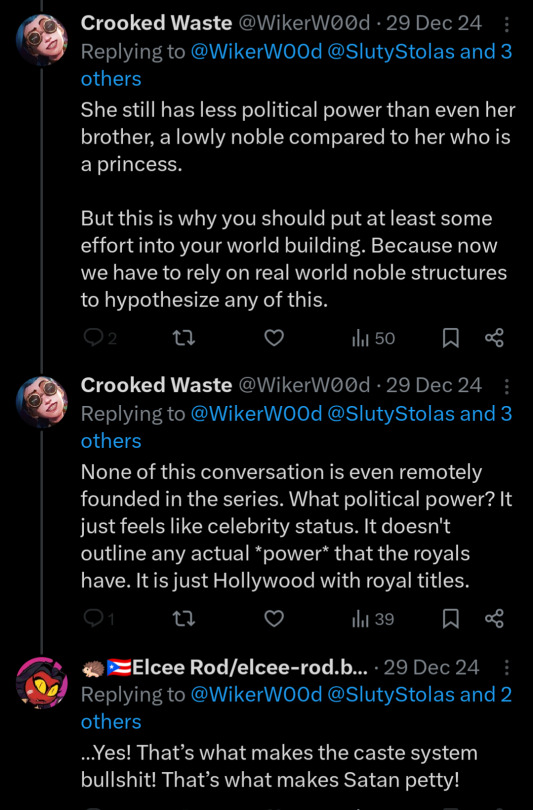
As much as the elites of our world would like to disperse the truth, the reality is that all societies are constructed around power. Who has power, how and why. That is the fundamental basis of every social dynamic from children on a playground to the politicians in our governments. So the very first thing we should even approach in regards to the narrative is how does power work in this universe?
So when I responded to Elcee in the tweet being referenced, I am evaluating power and power structures. Mainly there are two wholly different constructs of power between something like the aristocracy and celebrities.
The closest thing to an aristocracy we have in our modern day are the financial oligarchs of Capitalism. Elon Musk, Jeff Bezos, Bill Gates, etc. They have control everything from how our political parties engage with us to how we think based on the wealth they were born into. They curate our lives behind the scenes in ways that sound worthy of a tinfoil hat, but isn't a conspiracy. The wealthy were threatened in the 1970s by an educated proletariate. In response to our questioning the Vietnam war, the higher education that was once free or at least extremely affordable suddenly became prohibitively expensive.
So much so that only the financial aristocracy could access it. Whereas working class individuals are forced to jump through hoops and prove themselves suitably subservient to the existing power of the oligarchy in the form of scholarship applications, teacher recommendations and application letters before being granted access. This is not a mistake or how it's always been, this is by design.
Meanwhile, Celebrities are not elites. While we think of celebrities as being overpaid and living in luxury, it only takes a glance over at Chappell Roan to see the difference. When Jeff Bezos or Elon Musk or any large corporate CEO walks the red carpet, they are treated as royalty. When celebrities walk the red carpet, they are commodities.
Celebrity is the modern day face of the American Dream. Gone are the days of a single family home and a white picket fence. The boom of content over art, luxury over practicality, and excess over comfort is directly the result of selling to the world the idea of capitalistic success, which just amounts to perpetuating the system of turning humans into money. And for as much money as these celebrities make, it has been proven over and over again that they are just as susceptible to poverty as any other working class individual.
Celebrities are products we buy, and when we stop buying them, they vanish.
Meanwhile the aristocracy, the financial oligarchy, thrives in obscurity.
The difference in power is about who still has it when we no longer see them. And the more invisible and pervasive it is, the more real it is. However one as an individual thinks about the celebrity class, they are simple a different type of specialized tool to the true power behind the scenes.
With that differential in mind, the Goetia function more like celebrities rather than CEOs, and while Elcee fails to see the bigger picture, that subliminally tells the audience that someone with the title of prince, with armies sworn to his allegiance and infinite cosmic power, is no different than a working class joe.
This isn't intentional propaganda, however. It's not her trying to further the agendas of Jeff Bezos intentionally. Just like my other post covering how Medrano tries to excuse cheating, not realizing the only time one can argue such a blanket concept of forgiveness for such a betrayal can only happen when the option of choice is non-existent (ie Divorce is not on the table for reasons outside of the characters’ choices), this is the danger of not engaging with media with your mind turned on. You will innately, no matter how careful someone tries to be, engage with the material through the eyes of the creator.
Celebrities and average people are the same: commodities in the face of real power. But Medrano cannot tell the difference between someone like Elon Musk and his employees. She sees the aristocracy, the ones who were born into a legacy of wealth, as “hardworking average folks”. And if you aren't thinking, you might find yourself implicitly believing that too. Deeper entrenching the power they have over you as an individual and society as a whole.
How we got to where we are in our real lives is mirrored in the media we consume. And that isn't an accident.
#ask and answer#power structures#helluva boss critique#helluva boss criticism#helluva boss critical#vivziepop critical#vivziepop critique#vivziepop criticism#elcee is such a tool
79 notes
·
View notes
Text
a summary of the Monaco Tea, creds to the lovely anon who sent me the article <3
btw most of the information on the family was in article one, the latter were more just info on real estate + off shore accounts
again, this info is all coming from the former accountant of the family:
Prince Rainier III was seriously considering changing succession laws so Caroline would be the head of the family and Monaco as he found Albert to be weak. Albert is said to be the "despised member of the clan" who would stutter while speaking to his father. Rainier even looked into what this would mean to the Grimaldi name since Andrea - at the time 17 - obviously carries his father's name (Casiraghi) and not his mother's (Grimaldi). Rainier told the ones carrying the investigation that this was done in case Albert died.
the funds from Albert's state endowment and his private funds would be mixed all the time.
Albert would say yes to essentially everything his family asked for, including a $30 million apartment for Stephanie
Palmero (the accountant) would frequently buy things for the family to keep "their privacy". He bought Charlene's engagement ring and multiple properties for the Grimaldi's in France. He would pay property taxes for those properties and have the family pay him back.
Caroline and Stephanie would frequently make use of and sell family property (Rainier's cars, family jewelry and art, etc) without letting him know, even though they technically belonged to Albert.
Caroline is in charge of the family's castle in Marchais, which he had an issue with as she would always go off budget.
he makes a note to pay attention to Pierre Casiraghi as he is very ambitious and his dealings in real estate could create problems (spoiler alert: it did)
Caroline is said to hate Charlene
the allowance that Charlene, Caroline and Stephanie receive increases constantly, which worried Palmero. As of late, they were: 1,5 million euros for Charlene, 900.000 for Caroline and 800.000 for Stephanie yearly. This follows the family hierarchy.
Jazmin Grace receives 86,000 dollars per quarter. In February 2010, Palmero had to spend $5,000 “extra for her birthday”. Albert also bought her a $3 million apartment in New York City.
Albert spends almost a million a year funding Nicole Coste's (the mother of Albert's second illegimate child) fashion business. It's all in Alexandre Coste's name as Nicole fears that Charlene might create issues when Albert dies.
loots about Charlene. She frequently demands high sums in cash, her personal chef is $300 a day, she has multiple undocumented people from the Philippines working in her staff, the celebrations for the birth and baptism of the twins was well over half a million euros, in eight years Charlene spent around 15 million euros when she received 7.5 million euros in endowment (the Palace didn't deny this and said that the accountant was simply told to pay the difference with the family's personal funds), she spent 965,000 on a villa in two and a half months, her office decoration cost a million euros, she requested 3 x 300,000 for her brother's house.
Palmero made sure to change Monaco's regency laws so in case something happens to Albert while Jacques is underage Charlene won't be regent. Instead, the principality will be ruled by a regency council.
Albert has a secret apartment in Monaco, bought by one of Palmero's secret companies. He also got rid of problematic photographs of Albert (hinted at blackmail).
there was a whole system for hiding sums used on "special missions". They were labeled DS (for special destinations) and with time were used to pay for an informal intelligence unit that operated within the police force of the principality. They'd collect information on those close to the family and even on politians of the principality. He would also pay journalists to paint a good picture of Monaco while Hollande was president in France and was constantly criticizing tax-havens.
the DS accounts would be used to hide over-budget situations, including budget for the children's nannies and the budget for the wedding.
they were terrified of the Panama papers, as a lot of money laundering funds go through Monaco and the family had accounts on Panamanian banks.
a link between a Russian billionaire and the Monegasque Minister of Justice was revealed in 2017 and the Minister was forced to resign. An investigation was launched by a French judge and there was fears that the palace would be involved: jurisdictional immunity was granted to members of the sovereign family by order. There was rumours that the French judge wanted to hear the Prince as a witness......he was told to leave the principality. He was accused of having, through his “behavior perceived as authoritarian and vexatious”, “endangered the proper functioning of the criminal justice system”.
the real estate market is a big point of collision here and a big focus of article 3. Nothing too interesting to report - Palmero says he tried mingling in the market to break down the monopoly of real estate owners in Monaco (centered around a bestie of the Casiraghi brothers) while Albert claims Palmero had close ties with some of the developers and tried mingling with things that were of interest of the government in order to make money. The real estate issue was what eventually led Palmero to be fired. Palmero and a former laywer of Albert who was his childhood bestfriend and is also now a persona non grata claims that Albert is now fully under the influence of the bestie of the Casiraghi brothers who now controls the real estate in Monaco.
Palmaro is STILL paying property tax on properties he bought for the family!! crazy!!
Palmero detailed a number of off-shore accounts that hold about 250 million euros of the family's fortune including a company created specifically for Charlotte Casiraghi. He passed on the information from that account to Albert's new accountant at a monitored meeting.
Albert's explanation is lowkey....pathetic. He claims he told Palmero to move all of his family's assets from off-shore accounts to Monaco but Palmero never did it and that was that. He claims he was never able to obtain a precise statement on the family assets due to Palmero's secrecy and Albert just trusted him. He claims Palmero would act in his name and refuse to delay his decisions.
#and that's what you missed on glee#again thank u so much anon you're the best!!!!#this was a wild ride#mpf
94 notes
·
View notes
Text
Rant time: the general atla fandom’s resistance to zukaang highlights a lot of problems in current fandom and fiction. The resistance is about a point around which we refuse imagination and connection. Specifically, we observe fiction as something to gaze at rather than to connect with. So, aang is denied desire because of his age, religiosity, and racially-linked gendered embodiment, which, this conservative portion of the fandom argues, should deny us to relating to or even considering his subjectivity.
“You’re Just A Child”: Aang’s Age

When it comes to shipping aang, suddenly the conversation becomes about the canon--the age gaps, the immaturity, the cultural ties. 12 years old is prime middle school age in the US, the very essence of sexual development. But many fandom members are not engaging with how they felt and experienced that age. Instead, they’re viewing Aang from a separate vantage point and expecting the same mental process from others. These are where the claims of p*do come from when talking about him within shipping. They suggest that engaging with his character is a desire to observe him voyeuristically since many in the fandom are not actually twelve (ignoring the fact that many fandom members are also significantly older than the other characters they adore and offer subjectivity). Their argument continues that it’s not possible to empathize with him. Only objectification is possible, especially in regards to sensuality, as if that is a category has a different process of psychological relating than all others.
But all this becomes most important for these fandom members when putting him in relationship to the other slightly older characters. These arguments must begin by ignoring the fact that most fanfics and art for the zukaang ship and most ships in the atla fandom are simply disengaged from the canonical ages of the characters. A ton of the works are aged up, and those that aren’t don’t discuss the ages because they are working on the assumption that everyone within their fic are at similar levels of maturity to engage with romantic feelings. At the end of the day, most artists and writers are more interested in exploring the dynamics between richly developed character traits that are pretty unrelated to the character’s ages. Still, ships with Aang, and especially Zukaang somehow receive the most attention for tensions due to the canonical ages (despite the creators disinterest in the topic). Even the Toph ships, which have a canonically younger character with bigger age gaps between her and her partners, don’t receive the same pervasive criticism as the Aang ships.
Avatar Aang: Aang’s Religion and Race
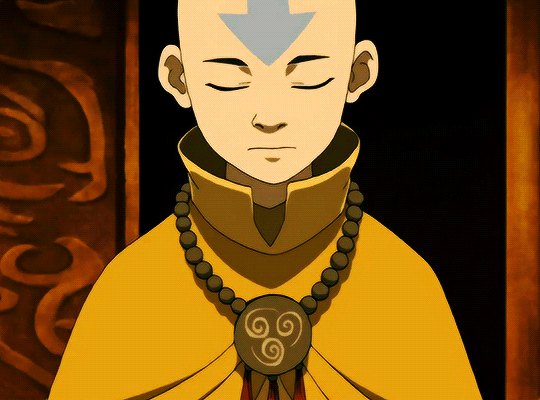
One reason is that he’s perceived as the “pure” cinnamon bun of the series; “pure” as in purile and “pure” as in puritanical. Plenty has been written about purity culture in the fandom, enough that I don’t feel a strong need to elaborate. However, I do want to point to Aang’s role as a religious figure, a monk, in the series. Perceptions crafted through the history of Christianity alongside the practices of many other religions associate religion and celibacy, which I think played into further discomfort with allowing Aang a sexuality. If this is your association, it would counteract Aang’s narrative development of wisdom and self-control to believe he might also be developing sexual maturity throughout the series. Of course, Zen Buddhist philosophies, which were majorly influential in developing the show’s themes and Aang’s character, allow for monks to have sex and get married, and they openly address issues of sex and sexuality. The deeply sexually conservative view held by purity culture then forces Aang, even moreso than other characters, into a de-sexualized pigeon hole.
A desexualized characterization is also a claim hefted onto East Asian men at a stupidly outrageous rate by Western culture. They’re allowed to be cute, mannered, wise, even cool, etc. but when it comes to a kind of subjective sexuality, East Asian men are emasculated (stemming from a deep history of Western colonialism/xenophobia and a specific kind of patriarchal ideology in Euro-America). The pacifistic Buddhist-inspired beliefs he practices especially render him as distinct from the rugged individualist of American masculinity and even the elitist intellectual masculinist of Western European cultures. Can masculinity exist without dominance? Can a relationship exist without antagonistic tension? Sure, we get the fluff ships, but where does that blur into and coexist with the erotic? Aang, as a character, forces the audience to consider the reality of his pain, desire, and strength, despite his refusal to demonstrate that in warfare and courtship. Among what manner would someone demonstrate these inner worlds if they won’t exert them on subjugated bodies? It’s a conflict of worldviews that took shape dramatically during the height of colonization, where the colonized were often blamed and maligned for their failures to resist colonization. These beliefs then developed into stereotypes about the masculinity of different races. The stereotypes that have held on from colonialism alongside of unique cultural ideas about masculinity make Aang a hard figure for people indoctrinated into these beliefs to appreciate.
Aang’s Gender Expression
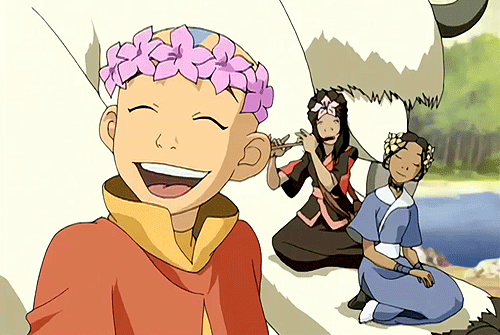
The fandom is forced to contend with his age, his colonized subjectivity, and, on top of all that, he’s denied the authority socially ascribed to his gender. Toph is the ‘tough guy,’ which Western audiences equate with more maturity, when what it actually equates to in the Euro-American psyche is masculinity. This correlation between masculinity and maturity allows Toph to escape the claims that make Aang an especially dangerous object for fanworks. Aang’s softness and passivity correlate him to femininity in this traditional perspective. Essentially, for the atla fans wearing their purity culture lenses, Aang, if sexualized, is feminine and therefore immature and therefore defenseless to predators. What’s wild is the way the Ember Island Players episode evokes and predicts these kind of reactions with its virginal damsel-in-distress actress depiction of Aang (”My hero!”).
But the zukaang ship really lends a microscope to the matter, because, in every demographic way, Aang’s character is denied the structural trappings of power within the relationship.This means that even those inclined to appreciate softer ideas about masculinity and/or more empowered ideas of feminine and colonized subjectivities can feel reticent to engage with the ship. Within an identity politic framework, the zukaang ship dynamics render Aang submissive: he is the colonized subject in relation to a colonizer; he is the more traditionally feminine partner; he’s more pious; he’s more passive; he is canonically younger. One might go even farther to suggest all of these submissive qualities make him seductive to Zuko in the narrative as he abandons his own nation for Aang, placing Aang in a trope familiar to both gender narratives within Euro-Christian traditions (the Biblical seductresses, like Eve and Jezebel, or more recently, Lolita) and colonial narratives (see, “Indian Princesses” or “Dragon Ladies”). If we go deeper into the archives we’ll also find colonial p*derast narratives (if you have a strong stomach, you can look up Andre Gide, as an example). All these possible features make the relationship especially threatening to modern sensibilities.
Now, I want to emphasize that there are legitimate reasons for the connections that we draw which ignite this fear. The article, “A Modern History of Groomer Politics” by Jesse Walker, lays out some of these complicated and hard-to-read histories, which illustrate how gay and queer rights (especially on the side of those assigned male at birth) became associated with p*dophilia. The Homoerotics of Orientalism by Joseph A. Boone is another read that lays out why people are especially sensitive to age gaps within queer colonial contexts. Suffice it to say, to engage with the zukaang ship requires a deft touch not simply to avoid these histories and tropes but, as seen in many of the fandoms works, to challenge them. Still, the associations trigger reactions for people before they can process any of the actual content.
But even outside the zukaang ship, there is a sense that Aang’s gender expression and sexuality are so much more queer (even the Kataang ship, in its heterosexuality, is perceived as transgressive to the romance genre in comparison to the more traditional Z*tara ship because many people find it challenging to imagine Katara’s attraction to Aang and feel so much more drawn to relationships built around hierarchical colonial relationships rather than relationships that ignore the colonizer entirely). He’s inherently disruptive to the gender expressions that are considered acceptable in western tradition, especially by the hero of the story.
Within the context of the zukaang ship, Aang’s character becomes the most queered, though, and I think that’s deeply uncomfortable for a portion of fandom. They don’t know how to allow someone subjectivity who uses docility as his strength to grow and face the world rather than aggression. Instead, for them, Aang’s docility traps him within a perpetual childhood (or, at most, a eunuch-like domestic role for the queen, Katara). Even as they allow themselves to alter every other aspect of the fiction they love, they are at a loss to handle and develop his character in their works. His youth, his race, and his imperfect saintliness, are all upheld and braided together within the confines of purity culture to argue against the morality of rewarding him romantic and subsequently sexual relationships, and, at its worse, to depict him at all.
#atla meta#zukaang#aang#buddhism#fandom problems#had this in my drafts for over a year#someone's message got me about people on twitter got me back to it#atla#meta
306 notes
·
View notes
Text
Don't you just hate it when one of the biggest grifters online decides to like a piece of media you like?
Gatekeeping is wrong. Forcing someone to like something in the specific way I interact and consume a piece of media is wrong. Art is meant to be viewed through a multitude of lenses, and each individual will have their own way of interpreting that creation. And that's good. That's fine. That's human.
But when an Anti-Woke Grifter who thinks alcoholism is a really cool personality trait and decides to brand everything about themselves as that; who has historically engaged and criticized films and shows and games and books in bad faith; who has put down women and POC's and Queer representation in media; who is one of the biggest dicks in the online space decides to actually pay attention to an art that is pretty much dipped, coated, laminated, and injected with fucking GAY, ANTI-PATRIARCHAL ENERGY—that's when I get mad.
For those not in the know, Critical Drinker has posted a review for Blue Eye Samurai, saying he likes it.
You know... Blue Eye Samurai?
The show that oozes Queer Wrath? Feminine Rage? Curb-Stomping Toxic Masculinity and the Patriarchy whenever and wherever it can? That Blue Eye Samurai?
See, he's done this before with Arcane.
He says he likes it. Him and his ilk say that, "Finally, the wokies have done something actually good!" and point to Vi and Jinx as strong female characters written well!
But they also say, dang, feels like all the men in that show are idiots and that they had to be dumbed down to make room for the rainbow-haired girlies brigade. Who have all remarked that Vi and Caitlyn's relationship is forced and being shoved down our throats because god forbid women like women!
I got sick of watching his Arcane review halfway, and this was before I knew what a douche Critical Sucker was.
So I ain't watching his Blue Eye Samurai review. Why?
His Glass Onion review was done in bad faith.
I didn't like She-Hulk, but that's because that show was a byproduct of abused VFX animators, creatively bankrupt executives, and writers desperately trying to manage a convoluted shared universe that continues to buckle under its own weight. Political Stinker over here thinks that it's pandering, stupid, feminist garbage. He is one of the biggest Anti-Feminist voices in Youtube.
Him and his incel brigade have an obsession over hating Captain Marvel and Brie Larson. These basement dwelling cucks rant and rave over a mediocre duology and an actress that just lives in their tiny heads rent-free.
He says that they are removing men from leading roles and roles of great importance!
So why would I want to listen to an inebriated libertarian's opinions on a show that has become the show for lesbians, trans mascs, and other lovely brands of gay and feminism that he oh so despises? He'll most likely praise the action and violence and shit like that, then probably say that Mizu and Taigen's homoerotic rivalry isn't gay actually. Or that Mizu and Akemi's narrative foils don't scream enemies-to-sapphics. Or that Mizu, WHO'S NAME MEANS WATER AND HER ENTIRE CHARACTER REVOLVES AROUND FLUIDITY ISN'T IN ANY WAY SHAPE OR FORM FLUID IN HER GENDER AND SEXUALITY.
Fuck. I'm sorry. I don't even care if he doesn't say that. He's made so many disgusting, disparaging remarks about any piece of media that shows an inkling of progressive themes that what else am I supposed to expect?
If anyone watches it and sees this, lemme know. Watching an Anti-Woke bullshit video with just myself is just straight up wading through the desert without proper protection. No thanks.
Anyway watch Blue Eye Samurai again. Because I know you watched it. Watch it again. And again. And when you're done, watch Arcane. Watch She-Ra. Watch Dragon Prince. Castlevania. Watch anything "woke". Consume trans-positive shows. Make all the haters and even the ones who like it but have no ounce of media literacy irrelevant. Let them dry out and die, please.
#blue eye samurai#mizu#mizu blue eye samurai#taigen#akemi#arcane#vi#jinx#castlevania nocturne#castlevania
82 notes
·
View notes
Text
The Ultimate Guide to Writing Persuasive Arguments
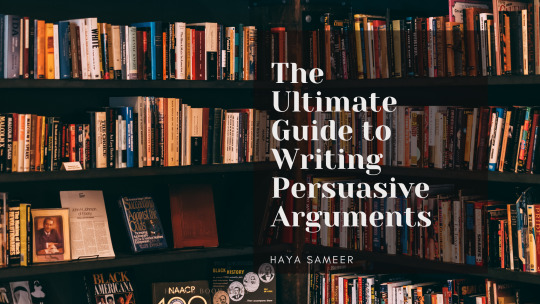
Within the vast landscape of written expression, where words hold the potential to shape opinions and ignite change, the art of crafting compelling arguments stands as a formidable force. As an author, I recognize the tremendous opportunity we possess to harness this power and leave an indelible mark on our readers.
I was recently asked to write a blog about creating argumentative scenes, I found the topic quite interesting as arguments and persuasion are something authors of all genres can find themselves writing. Anger is a very raw emotion that authors often feel the need to perfect, I hope this guide on how to write persuasive arguments can help you reach that point of perfection.
Understanding the Power of Persuasion in Fiction
Persuasion in fiction goes beyond convincing readers of a particular argument or viewpoint. It involves crafting narratives that engage readers on multiple levels, influencing their emotions, thoughts, and even actions. Just like skilled orators sway their audiences, we can use the tools of persuasion to captivate readers, immerse them in our stories, and make them feel deeply connected to our characters and themes.
By masterfully crafting persuasive narratives, we can make readers question their assumptions, reconsider their beliefs, and view the world through a new lens.
However, it's important to note that persuasion in fiction doesn't mean manipulating or forcing readers to adopt specific viewpoints. Instead, it's about presenting compelling arguments within the context of our stories and allowing readers to engage with them organically. Through our characters' journeys, conflicts, and personal growth, we can subtly challenge readers' perspectives, encourage empathy, and foster critical thinking.
Your character doesn’t have to necessarily be wrong or right and it is important to remember your readers can always have a viewpoint completely different from your opinion of your character and that scene.
Developing Convincing Characters and Narratives
Captivating characters possess the power to sway readers' hearts and minds. They are multidimensional, relatable, and possess qualities that make their actions and beliefs compelling. By carefully sculpting our characters, we can infuse them with the ability to embody persuasive arguments and engage readers in thought-provoking ways.
To create convincing characters, we must delve into their backgrounds, motivations, and desires. What drives them? What are their core values? Understanding their unique perspectives allows us to shape their beliefs and opinions, providing a foundation for persuasive storytelling. When our characters' convictions align with the arguments we wish to convey, their authenticity and passion become catalysts for reader engagement.
Character Examples
In Angie Thomas' powerful novel, "The Hate U Give," the protagonist, Starr Carter, serves as a compelling argumentative character.
Through authentic dialogue and poignant internal monologues, Starr articulates her experiences, frustrations, and desires for a more just society. Her arguments against racial profiling, police brutality, and the need for equality are rooted in her personal journey, allowing readers to empathize with her and reflect on their own biases and prejudices.
By skillfully intertwining character development with persuasive arguments, Angie Thomas creates a protagonist whose voice and convictions leave a lasting impact. Starr's transformation from a reluctant witness to a courageous advocate exemplifies the power of persuasive storytelling, inspiring readers to challenge injustice, examine their own beliefs, and work towards a more equitable world.
Crafting Engaging Dialogue
When it comes to persuasive writing, crafting engaging dialogue is a powerful tool that allows us to convey arguments, challenge beliefs, and captivate readers. Effective dialogue not only propels the plot forward but also serves as a vehicle for persuasion.
To craft engaging dialogue with persuasive impact, consider the following techniques:
Character Voice: Each character should have a distinct voice that reflects their personality, background, and beliefs. Whether it's through word choice, dialect, or speech patterns, make sure their dialogue is authentic and consistent. This authenticity lends credibility to their arguments and makes them more compelling.
Conflict and Tension: Engaging dialogue often thrives on conflict. Introduce opposing viewpoints and create tension between characters with differing opinions. These clashes of ideology can spark thought-provoking debates and allow readers to see multiple sides of an argument.
Subtext and Nuance: Effective dialogue often goes beyond surface-level conversations. Include subtext and underlying emotions to add depth to your characters' interactions. What remains unsaid can be just as powerful as what is spoken, allowing readers to infer hidden motives and subtle persuasions.
Relevance to the Plot: Ensure that your dialogue serves a purpose within the larger narrative. Use it to advance the story, develop characters, or explore thematic elements. When dialogue aligns with the overall arc of the narrative, it becomes an integral part of the persuasive storytelling process.
Emotional Impact: Infuse your dialogue with emotion to create a deeper connection with readers. Engage their empathy, evoke their curiosity, or stir their passion through the heartfelt words exchanged between characters. Emotional resonance enhances the persuasive power of your arguments.
Utilizing Descriptive Language and Imagery
By skillfully utilizing descriptive language and imagery, we can immerse our audience in the world of our story and strengthen the persuasive nature of our arguments.
Appeal to the Senses: Engage readers on a sensory level by incorporating descriptive details that evoke sight, sound, taste, touch, and smell. By immersing readers in the sensory experience of a scene, you can make your arguments more tangible and relatable.
Paint Vivid Settings: Transport readers to vibrant and immersive settings that act as a backdrop for your arguments. By creating a rich visual landscape, you can enhance the persuasive impact of your words and immerse readers in the world of your story.
Evoke Emotions: Harness the power of emotion to make your arguments resonate deeply with readers. Use descriptive language that elicits a range of feelings, whether it's anger, empathy, awe, or hope. Connect with readers on an emotional level, and they will be more likely to embrace your persuasive message.
Plotting and Structuring Persuasive Storylines
Crafting persuasive storylines requires careful plotting and effective structuring to engage readers and convey your arguments in a compelling manner. By strategically organizing your narrative elements, you can captivate your audience, build tension, and ultimately deliver persuasive messages that resonate long after the final page. Here are key considerations for plotting and structuring persuasive storylines:
Establish Clear Goals: Define the central objectives of your narrative, both in terms of the overall story and the persuasive arguments you aim to convey. What do you want readers to understand or believe? Set clear goals to guide your storytelling, ensuring every plot point and character arc serves the purpose of advancing your persuasive message.
Build Rising Tension: Structure your storyline to escalate tension and keep readers invested in the outcome of your persuasive arguments. Craft each plot twist and revelation to heighten the stakes, gradually intensifying the conflict and presenting new challenges that test characters' convictions.
Use Narrative Devices: Employ narrative devices such as foreshadowing, flashbacks, and dramatic irony to enhance the persuasive impact of your storylines. These devices can provide deeper insight into characters' motivations, reveal hidden truths, and strengthen the arguments you present.
Balance Pace and Reflection: Find a balance between fast-paced action and reflective moments to allow readers to digest and connect with your persuasive messages. Provide opportunities for characters to contemplate their beliefs, engage in meaningful conversations, and undergo personal growth, which reinforces the authenticity and impact of their arguments.
Editing and Polishing Your Argument
Editing is the key to refining and enhancing the persuasive impact of your writing. As you revisit your work, focus on clarity, coherence, and compelling language. Here are essential editing steps to maximize the persuasive power of your piece:
Streamline Your Argument: Trim unnecessary details and tighten your arguments. Ensure each sentence and paragraph contributes to the central message, eliminating any tangents that may dilute the persuasive impact.
Enhance Clarity: Clarify your ideas by simplifying complex concepts and using concise language. Avoid jargon or technical terms that may alienate or confuse your readers. Opt for clarity over complexity.
Strengthen Structure: Check the flow of your piece, ensuring a logical progression of ideas. Arrange your arguments in a coherent manner, guiding readers from one point to the next with clarity and coherence.
Choose Compelling Language: Use powerful and evocative language to captivate readers. Employ vivid verbs, descriptive adjectives, and figurative language to engage their senses and emotions, heightening the persuasive impact of your words.
Proofread for Errors: Eliminate grammatical, punctuation, and spelling errors that can distract readers from your persuasive message. A polished and error-free piece lends credibility and professionalism to your arguments.
I hope this blog on the ultimate guide to writing persuasive arguments will help you in your writing journey. Be sure to comment any tips of your own to help your fellow authors prosper, and follow my blog for new blog updates every Monday and Thursday.
Looking For More Writing Tips And Tricks?
Are you an author looking for writing tips and tricks to better your manuscript? Or do you want to learn about how to get a literary agent, get published and properly market your book? Consider checking out the rest of Haya’s book blog where I post writing and marketing tools for authors every Monday and Thursday
#hayatheauthor#haya's book blog#haya blogs#writing prompt#writing tools#writing stuff#creative writing#writing tips#writing blog#writer community#writing advice#writer tips#writing community#writer things#writing life#writing things#writing tip#writing techniques#writing topics#writing tool#writing tumblr#writing resources#writing inspiration#writing inspo#writing reference#writer#writersofinstagram#writers on tumblr#writers block
192 notes
·
View notes
Text
eloise is my bitch and here is why
never thought i would do this- but here is a very lengthy post on why eloise is actually an AMAZING CHARACTER (notice how i said character, not person !!)
ok i understand the criticisms that come with eloise, i get it. she's naive, a bit self-centered, and tends to not be open to opinions that contradict her own. she was not the best of friends to penelope, pushing her own ideals unto her, and admonishing her for having dreams that
were not her own. she is not a girls girl, as she does not see activities/hobbies that are traditionally more "feminine" as valid interests but as a symbol of oppression. she judges too harshly on people who don't think like her, immediately thinking that they don't possess the
same level of intellect as her. BUT honestly, i think her character is more nuanced than this, and is not as flat as people make her out to be. eloise is the perfect example of a girl sick of the oppression women face IN THIS TIME PERIOD. you see that? in THIS TIME PERIOD.
for a 17 rich girl, its not surprising that she thinks this way, especially living IN HER TIME PERIOD. in this time period "feminine" hobbies are forced upon women, not a choice. while a craft like embroidery is certainly commendable and amazing, we must understand that at least
for eloise, these activities have been forced on her, ones that will help her find a husband. eloise does not view this activity as something that liberates her, but giving into it oppresses her even further. to be honest, in this time period, why else would the women engage in
these activities if not for being a more suitable marriage candidate? for eloise, participating in this activity or any "womanly" activities is perceived in her eyes as giving into societal pressures. so i don't think eloise is necessarily putting down more seemingly "feminine"
activities/hobbies, but is rather befuddled as to how someone could enjoy it, as it is only seen as something to help women in the marriage market. how could someone enjoy an activity that women have been *told* to like, when that is the essence of what eloise fights against?
to be honest, i feel like the comments against eloise are spoken in a modern context, in a context where we know now that embroidery and fiber arts are commendable professions. and if this context is taken of course eloise's actions are seen as unjust.
and to be honest, her reaction IS annoying. as a fiber artist, its always annoying to have my passion dumbed down, to something that does not demonstrate the true power of it. but still, would we really expect eloise, a 17 year old rich white girl who has never read books beyond
her home, to be able to have the opinion that we have? of course not. in her time period her opinions make sense, and i feel like its unfair to judge her character in the context of modern thinking. eloise doesn't know better, and while it is not an excuse, i argue that it makes
her an even better character, one that has so much more room to grow, so much more room to change. i feel like we must remember that she is only 17, a girl is still figuring the world, especially in a time period when women only hold worth in the heirs they produce. of course her
opinion is shallow and lacks depth, SHE'S 17!!!! why wouldn't she be insufferable? i feel like in tv today we always want characters to have no faults, or at least not faults that may make them look like a bad person. this takes away the journey the character may encounter,
that gives more depth to a character and shows us why they think that way, why are like this. nobody likes a women who voices her opinion without regard to what others might think, and to be honest i think that that's one of the biggest reasons people don't like eloise. now i'm
not saying that i support eloise's actions, or that i think she is a "good" person. but i do think she is a phenomenal character and very accurately depicts what a girl with her background may end up being. she has so much room for growth, and is, if you couldn't tell, my fav <3
so stop hating on her because she's not a "girl's girl," because honestly why would she be based on her upbringing and the TIME PERIOD!!!!!!!!!!!!!!!!!!!!!!!!!!!!!!!!!! she's a 17 year old girl guys calm tf down
#bridgerton#eloise bridgerton#character study#she is conceited little shit but i love her!#bridgerton season 3#bridgerton spoilers
21 notes
·
View notes
Text
#love story
One soul for two.
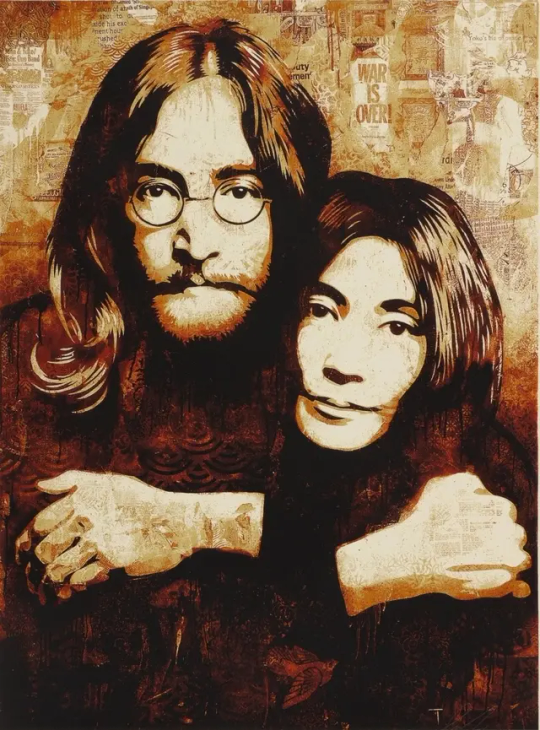
58 years ago, on November 9, 1966, John Lennon first met Yoko Ono at an art show in London, where she presented her exhibition "Unfinished Paintings and Objects". To this day, many believe that this was the beginning of the end of the holiday era called the Beatles.
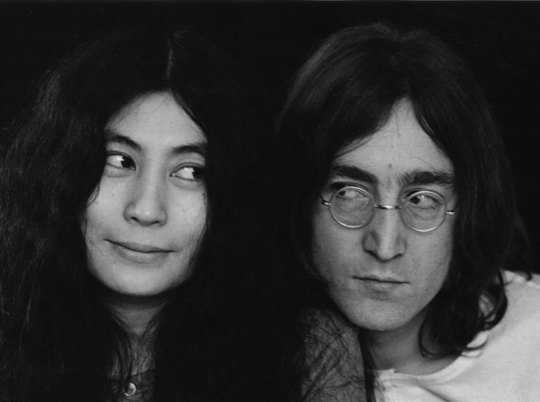
Without realizing it, he had long been looking for a woman who looked like his frivolous mother Julia and domineering aunt Mimi, who raised him. Everything was smooth in his marriage with his wife Susan — she did not burden him with herself, did not bother him with conversations, cooked well and was great in bed. Another man would have carried such a woman in his arms, but not Lennon. He lacked madness, passion, hooliganism. Critics will later write about this period of John's life:
"When you get everything in your youth, life becomes insanely boring and insipid. You will involuntarily start looking for adventures."
They first met in November 1966. Lennon, on the recommendation of a friend, went to the Indica gallery for an exhibition of "anti-art". The spacious hall was crowded, everyone was talking about something, discussing the latest news. John has always resisted this society of snobs and mawkish intellectuals. Out of boredom, he decided to take a walk and suddenly came across an inscription: "Beat it up." Lennon wanted to carry out his plan, but a voice called out to him: "Only for five shillings." That's what Yoko said.
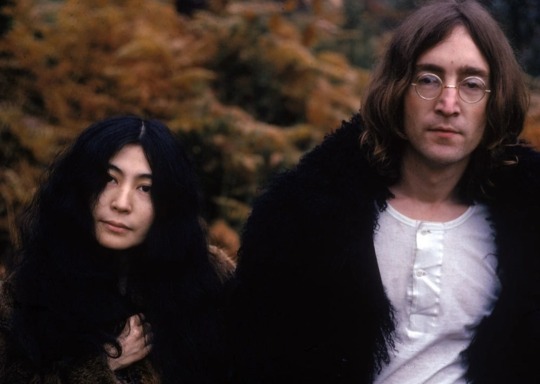
This was the first time he saw the woman of his whole life, but he did not attach much importance to the fateful acquaintance. And the very next morning I received my first message from her — a book where She talked about the world order, the meaning of life and all that, which the famous musician, who had had enough of the love of the audience, did not care about. From that day on, the persistent Japanese woman continued to attack John with notes, calls and sudden meetings.
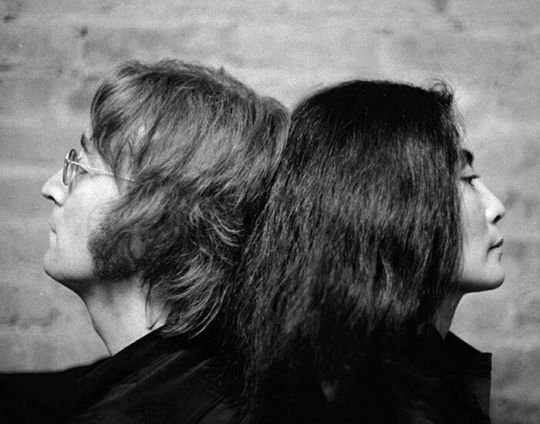
It was not the first time that the Japanese woman bewitched men with her unflattering beauty. She has already had two marriages under her belt — the first with the talented but poor composer Toshi Ichiyanagi, the second with producer Anthony Cox, who pulled Yoko out of depression several times, but, alas, did not deserve her love. The couple divorced as soon as Lennon's muse managed to win over his genius.
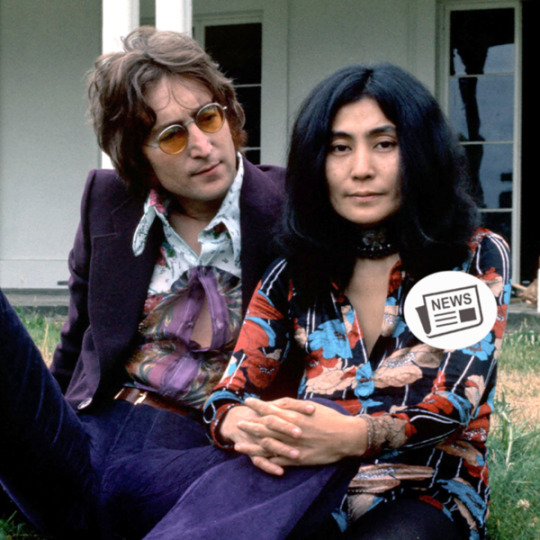
Susan immediately suspected something was wrong and demanded an explanation from John. He waved it off, saying that she was a crazy artist. But Yoko did not even think about giving up, she bent her line until Lennon's marriage finally fell apart. Leaving his wife, he shouted in his heart that their son Julian was the result of an extra bottle of whiskey. Then it seemed to Lennon that he had finally found true freedom. He would later say that Yoko had replaced all those who had left his life and forced him to look at himself and the world around him differently.
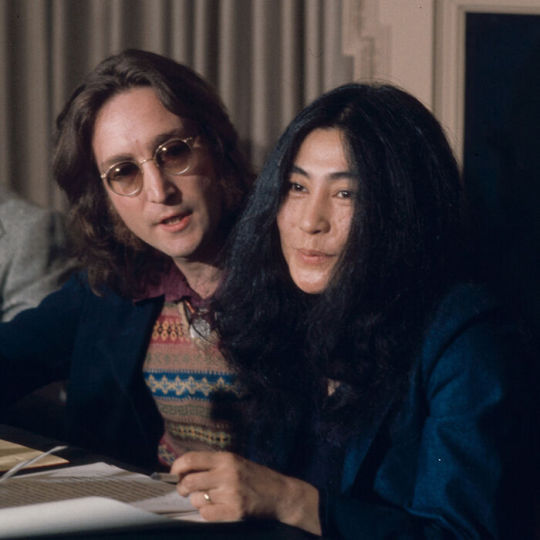
Paul McCartney and Ringo Starr still remember the day when Ono first entered the recording studio with Lennon. John didn't even want to listen to his friends who tried to explain to him that a woman didn't belong here. "She didn't know a damn thing about music, but she was telling Paul how to sing and me how to play the drums. We were furious, but there was nothing we could do about it. John didn't seem to hear us," Ringo said in an interview. In 1970, the legendary Liverpool Four broke up.
The band's business had not been good for a long time, the Beatles stopped writing new songs and were engaged in creativity separately, but millions of fans around the world refused to believe that the former team was no more. The angry audience immediately blamed Yoko for everything. The newspapermen happily picked up on this idea, and at the same moment headlines appeared in the press: "The Black Witch destroyed the Beatles", "The devil possessed the Liverpool four," but Lennon didn't care about it either: they completely dissolved into each other, even looked the same: shapeless clothes, round glasses and long Her hair was parted in the middle.
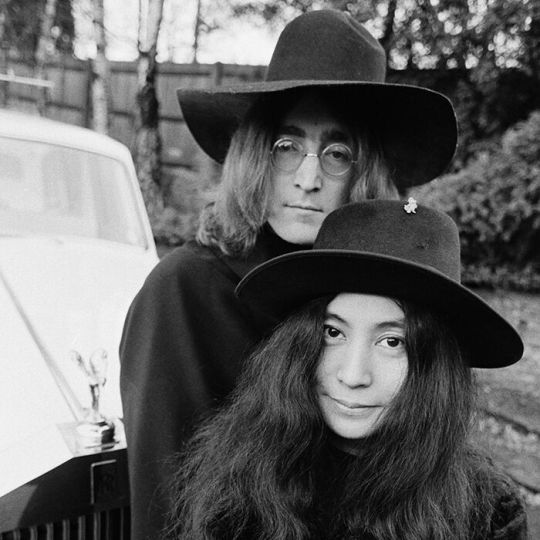
Shortly before the breakup of The Beatles, Lennon and Yoko set up their own studio where they could create whatever they wanted. It is here that John will record his famous album Imagine. Later, critics would recognize him as the best musician's record, and the real "Beatlemans" would grab their heads and curse his Japanese muse with renewed vigor.
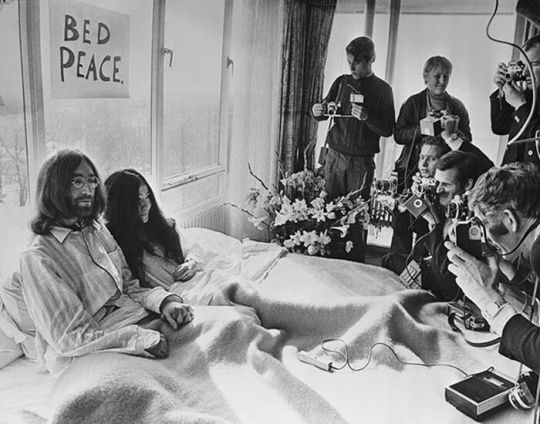
In 1969, the mad lovers will get married in Gibraltar, the ceremony will last a record 72 minutes. And again, all traditions will be broken, it's not Yoko who will take John's last name, but he will take hers. Back in Amsterdam, the happy newlyweds will rent a presidential suite in one of the city's hotels, change into pajamas and... call together journalists. This "recumbent conference" lasted for several days, as the couple fought for world peace.
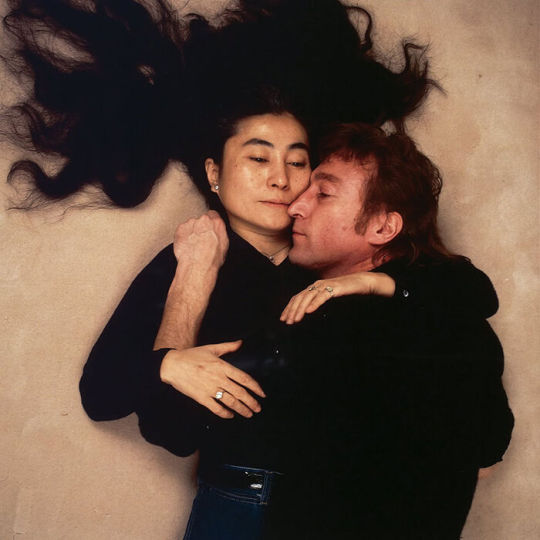
They were inseparable for four years, but the family idyll ended when Lennon noticed another woman at a party in honor of the election of the next American president. Tipsy, John took the guest into the next room and made love to her. Like a true Japanese woman, Yoko did not make scandals for her husband in public, but only asked him to hand over the flower and say that she still loves him.
John spent the next year and a half in Los Angeles, where It allowed him everything he loved so much: alcohol, fun, women. She even picked up her secretary, the pretty Mei Pang, as a lover. Lennon was happy at first: "You are the most understanding woman in the world," he told his wife on the phone.
Loneliness quickly got tired, John wanted to return, but Yoko was adamant. To her husband's pleas, she replied sharply: "You are not ready yet." As Mei Pang later told me, it all ended abruptly. Ono called her and said that she had found a person who would help John quit smoking. So Lennon came home. Reconciliation with his wife ended with the conception of a child, whom both had long despaired of waiting for after several miscarriages. The birth of Sean's son finally put everyone in their place.
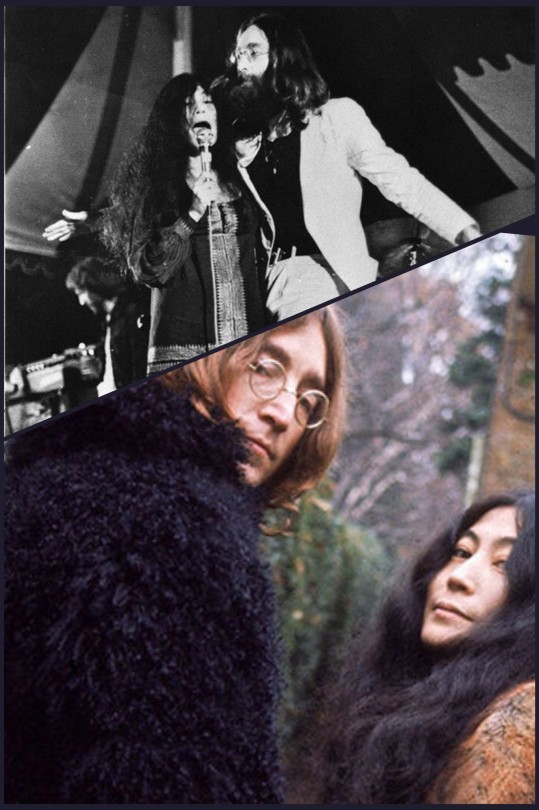
Now John was tinkering with the baby, and Yoko was arranging exhibitions and buying up expensive real estate with the money left over from the Beatles ships. Friends often teased Lennon. "You sing about freedom, a world without property, and you live in a six-room apartment with separate rooms for furs and shoes." John himself had long been sick of such a life, but how could he contradict a woman he loved to distraction.
In 1980, the former Beatle would record the last Double Fantasy album in collaboration with Yoko Ono, and a week later he would be shot by a mad fan Mark Champion. In an interview, Lennon's killer will say that he thought John was a god, but at some point he came down to earth and became an ordinary person. "Then it seemed to me that I was going to shoot the picture on the album cover, a two—dimensional celebrity without real feelings," Champ confesses to reporters while already in prison. Former detractors will suddenly begin to sympathize with Yoko and feel sorry for the woman who lost the best man. But It will not even think of grieving.
A week after her husband's death, she will put up for auction his letters and albums, and six months later the media will tell that the eccentric Japanese woman has remarried. However, this marriage will be short-lived.
#love story#on this day#john lennon#yoko ono#the beatles#beat#beatlemania#music#my music#music love#musica#history music#spotify#rock music#rock#rock photography#my spotify#Spotify
13 notes
·
View notes
Note
Thoughts on the clowns going from an interesting representation of one's dark side and the temptation to induldge self destructive madness, into just generic faceless mooks with no personality or point besides bloating the already overstuff moon arc?
It’s wrong for me to generalize, but it seems like most final arcs in serialized stories suffer when they introduce new characters or details that inevitably will not get enough time to develop. This should work: it’s the last arc, break all the rules, so long as the result ends up being a spectacle or too cool not to do or so shocking but concise in reiterating the message that has been reinforced over and over in this story…and the clowns just don’t do any of that--the spectacle isn’t engaging enough, I thoroughly enjoy clowns in pop culture but even these clowns in Soul Eater aren’t that engaging visually or personality-wise, and nothing about the clowns does much to reinforce any message, or at least reinforcing the message of “fear is always with you” in any fashion that another part of the manga didn’t reinforce better.
And I don’t mean that Soul Eater should be criticized only because the clowns don’t get to develop to their full potential: I can’t think of any series where even main characters reach their full potential in their entire story because that’s not how storytelling works, that’s perfectionism and hence a fool’s errand. No, I mean that the characters and details are just there without any sense of progression, elaboration, or sometimes any use to the story aside from cannon fodder.
And that is what the clowns feel like: cannon fodder, antagonists that can be done away with easily not only because their personalities are so limited that we feel almost no sadness or any other emotion when they are gone and not only because their power sets are so dull that they can easily overpowered by the protagonists and we won’t miss losing that power set because they weren’t cool enough at all but also because they are dehumanized so killing them off is not regrettable. Oh, Stein wasted a ton of clowns? Who cares--they weren’t human, and they were barely humanized at all, including, again, in terms of having almost zero personality.
And yet, all of this could be salvaged if the clowns had something to them that was reflective of the larger themes of the story. As you point out, the clowns in parts of Soul Eater were indicative of a character’s dark side. We got to see how jealous Maka can be, how fearful she is of losing her father and her friends and teammates, and how powerless she feels without Soul. All of that is much needed character progression. Yes, I can be frustrated that it still feels a bit forced similar to throwing these details in during the Book of Eibon arc, but it makes sense that Maka would be this emotionally raw after Crona was kidnapped. It is also visually striking: look up just about any Maka clown art by Z-Raid and other illustrators.
But even then, aside from Maka, what did the clowns actually show us about any character’s dark side?
We get that with Justin--but even then, the clowns themselves don’t have much in the way of personality to get a sense of how they corrupt Justin. Granted, just about all of Justin’s story only works because of how little is given to us to show how he got corrupted. We know the ��why,” we get belated clarification when Justin fights Tezca. But the clowns never have much in the way of personality to give us a sense how this unfolded. It’s good storytelling potential, likely something someone else did in their own fan works. But I wish Ohkubo had committed to some choice. We already have Ragnarok right there at times acting like a bad conscience on Crona’s shoulder--is that how a clown should act towards Justin? Should it be like the Symbiote telling Eddie what he wants to hear, more like what we got in Weisman and Cook’s Spectacular Spidey animated series?
Edit: I forgot to mention--elliotthezubat once again handles this stuff better: Justin's dilemma works better if you have it more like a clone of himself talking to him, a conversation between two Justins to emphasize different dimensions to his personality and the potential split happening, or the potential for one side overwhelming the other.
When the clowns did pop up to fight for Medusa against Black Star and Tsubaki, and against Team B with the Thompsons, was there really anything gained? Any character progression for Black Star was actually more from fighting Crona, not from fighting a clown, to demonstrate where Black Star and Crona could have gone had each one had different intervention by a parental figure, Black Star at least having Sid and the DWMA, Crona being stuck with an abuser like Medusa. But did the clown unlock any such insight into Kilik, Ox, Kim, and their partners, or Liz and Patty? The clown was just a scientific experiment without any personality of their own. (See also how Ragnarok gets reduced to almost a non-entity as the series persists, and his commentary on what Crona is going through is sorely missed, whether to add insight or just some Falstaff-ian comedic relief with how dire things are getting.)
The final arc had two major opportunities to justify the importance of the clowns: the characters as their own entities, and the characters as reflective of the path Stein could take. And then the arc fails to live up to either potential.
Let’s start with the latter first: like the clowns, Stein is falling more and more into madness--and then on the Moon he just doesn’t, instead weaponizing the madness to lay waste to Asura’s forces, re-establishing that even under madness he is still the same person and his commitment to Death and the DWMA does not falter. I’m not asking that the story continue to milk the angst of Stein after Buttataki’s murder, or take the path of the first anime and show Stein falling under Medusa’s sway. But with this being the last arc, this is the last chance to re-establish Stein is a good person. We need that Iron Giant moment hitting us over the head: we didn’t need the Giant to say, “I am not a gun,” but it summarized the point in an obvious fashion. Where is that moment for Stein? Is there a quotation or a panel from the final arc that I’m neglecting that adequately summarizes how Stein’s fight against the clowns is a rejection of the path Stein could have taken and in his last battle in this series recommits to his characterization, how he has progressed throughout almost 100 chapters, where he goes next, and some larger message the manga is trying to say or at least tie into the ongoing themes about courage, fear, and collaborative work? I don’t get that from Stein’s fight against the clowns, but maybe someone else and can share that quotation or panel.
As for the clowns as their own entities: what do they serve, in terms of their own character progression, or as larger allegorical or symbolic value, or as antitheses or foils to our protagonists? They just seem to be a grab-bag of mythological and literary references: rabbit on the moon, the story of Kaguya. What is Kaguya supposed to tell us in Soul Eater as a foil to Kid? Or, how is she a continuation of ideas Ohkubo is toying with when writing Blair and then later Tamaki in Fire Force? None of these questions really interest me because the potential answers are dull: there is barely anything between Kaguya and Kid to indicate a battle of differing philosophical viewpoints, Kaguya’s shtick is somehow more dull than Blair’s and lacks the other dimensions Blair has (whether in the manga or because fan writers are better at handling her), and the path from Kaguya to Tamaki is just a reminder how gross Ohkubo is when it comes to his attacks against feminism and readers who just get tired of his endless horny misogynistic bullshit. If you just want naked Kaguya, then just go naked Kaguya--that’s more honest and a clearer understanding why this character is here than dressing it up (so to speak) with pseudo-intellectual posturing to try to make her presence and maybe even this arc and this entire manga into something it’s not.
Or, they’re just leftovers from B Ichi, seeing as they are called “Dokeshi” in the original Japanese version of the Soul Eater manga. Super--this is somehow the less annoying version of Ohkubo’s same trick, that being waiting until the final arc to gesture back to the author’s previous work. I should appreciate that the final arc of Soul Eater referencing B Ichi is a harmless Easter egg, compared to the final arc of Fire Force ruining the continuity and thematic cohesion of Soul Eater.
And that’s not even getting into how the clowns just re-populating because of Asura’s almost infinite power of madness.
At least “madness and fear are always with humans” is a clear, understandable message. But clowns? I get that clowns are scary to a lot of people, and their exaggerated details and potentially inhuman grotesque shape is decent shorthand. But this also feels like a failure of using the images to address the message: not everyone is going to find clowns scary, even taking something from childhood enjoyment and making it fearsome isn’t much of a deep message: “I made the things from your childhood edgy” strikes me as lazy. It’s as bad as Ohkubo assuming breasts can only be maternal and must be only a yearning for maternal love as in the final chapter of Soul Eater, or Ohkubo’s regressive cisheteronormative approach to sex as existing only for baby-making and that the idealization of sex appeal is embodied only by an underage teenage girl (again: Ohkubo is fucking gross, fuck this guy) in Fire Force.
This is Ohkubo latching onto a small set of visual details or story tropes he likes and not letting them go. And it again disrupts what we already had: we go from Shotaro in B Ichi being a good guy who is clownish and literally turns into a clown as a final power-up form, to clowns just being absolutely evil in Soul Eater. Again, what is it with Ohkubo taking something from a previous manga, introducing it into another manga--and then taking a completely different approach in that new manga that contradicts what he did before? I can appreciate an author changing their mind over time, but it also comes across as a failure to let the previous work stand on its own and a refusal to let the message of that earlier story persist without needless contradiction by a later work. It comes across less as the author maturing and changing their mind with time and more like a creator who just wants to keep contradicting themselves for the sake of spurring on an argument (and more attention for the sake of more book sales).
14 notes
·
View notes
Text
Earlier this year, TIME wrote, "'Yellowjackets' — like so much recent TV about young women, matriarchy, and the mixed blessing of personal empowerment — also forces us to consider whether its girls might have been better off in the off-grid society they created for themselves." And given those themes, the friends I mostly discuss the show with, trading theories and memes over long message threads, are women. Some men I've tried to share the Showtime hit with have been less than enthusiastic, which has occasionally been mirrored in critics' responses, especially when the show first aired.
It's unclear if their reticence is old-fashioned sexism, an unwillingness to engage with trauma and its aftermath, or something else perhaps related to the show's centering of women, girls and violence. Matthew Jacobs called the show "inessential" in his review for TV Guide, while Brian Lowry of CNN described it as "a disappointment" though its "stars still merit a look."
Good news, men. A hero has arisen from the ashes of Flight 2525 (well, technically he arose from the smoldering home fires back in New Jersey, where he was left). He's ordinary and he's awesome. It's Jeff! And he's here to elevate white man mediocrity. Look out, guys. There's someone new, supportive and extraordinary just by being ordinary in town.
"Yellowjackets," now in its second season, follows the high school girls of a champion 1996 soccer team whose plane crashed in the Canadian wilderness. The survivors turn to desperate measures to make it through the harsh winter, and the show follows two main threads: the 1996 woodsy trauma and what happens to all the survivors later as adults. Spoiler alert: they don't feel or do so great.
As the husband of our main Wiskayok star, Shauna, Warren Kole is Jeff. He runs a furniture store. He married his high school sweetheart. Well, technically he married the girl he was cheating on his high school sweetheart with. But he did marry the mother of his (possibly multiple) children. He married young and has stayed married in the face of difficulties. He has the floppy hair of a YA love interest (perhaps a nod to Shauna's teenage dreams), despite being in his 40s. Jeff is the definition of peaked in high school, the golden boy who never left town and never did much. He's also done everything.
Jeff is every man. Specifically, he's every man in a TV show led by women. He's Dean Boland to glamourous criminal mastermind Beth Boland of "Good Girls," Rob to mayor Margot in "The Power." Jeff is not the main attraction. He doesn't get the teary, intense, Emmy-worthy speeches (that's Melanie Lynskey's Shauna). He doesn't get to wave the gun around (OK, that's Shauna too). He's not the action star or any star. His attempt to do crimes ended badly, and with him covered in glitter. Shauna thought he was cheating on her (Jeff would never), but he was simply fumblingly trying to blackmail her friends. It didn't end well. Nothing Jeff does ends well but he keeps on trying, the Energizer Bunny of husbands.
Jeff is a simple man. He works out at the gym. He's excited about making sales at work. When he gets upset, he deals with his anger by listening to Papa Roach alone in his car and violently air drumming. He enjoys eating dinner with his family, and when the women in his life, Shauna and defiant teen daughter Callie (Sarah Desjardins) tell him things, he believes them. Jeff is a believer. His exterior of tanned, floppy commonness conceals a steadfast heart of gold. He's pure. If you tell him you're going to book club, he believes you're going to book club. Why would you lie to him? Why would you murder? (If you do, though, he's got you.)
Jeff supports his wife through an avalanche of devastating revelations. She had an affair. She murdered a guy. Not only does he not leave Shauna upon the news of her cheating, he doesn't leave after the killing either. He does what he can to support his family. He's read her teen diaries, trying to understand the most difficult and life-altering trauma of her life, which not every man would do or care to know about. That trauma includes Shauna eating his high school girlfriend. Again, not every man is going to get over that.
But Jeff's got Shauna's back. And in doing so, perhaps he understands more than any male character in recent memory: trauma changes you. Violence is forever. Shauna is the way she is (secretive, hypervigilant, occasionally violent and cold) because of the past, and the past is always with her. Jeff accepts her for who she is, not the idealized way she could have been if only those terrible events hadn't happened, if only that plane hadn't crashed and everybody got real hungry. Jeff is the evolved man, the ally who has done the work (reading the diaries! Burning the diaries! Cleaning up the murder/affair evidence!).
He's willing to try new things, like strawberry lube. He's amendable to change, to doing the work. He wants it all to work out, and he loves Shauna because, as he says, she's the smartest woman he's ever met. Jeff is a blueprint for a way to be a good man. Rise himbo, rise. Not all heroes wear capes. Some of them wear sleeveless hoodies.
#yellowjackets#jeff x shauna#this is such a delightful and hilarious read#regarding the bold part: i think they're gonna end up back there anyway#just maybe not in the way we think since they brought 'it' with them#but these women can't go back to normal society
62 notes
·
View notes
Text
La Planète Sauvage (1973) Race in the Imaginary
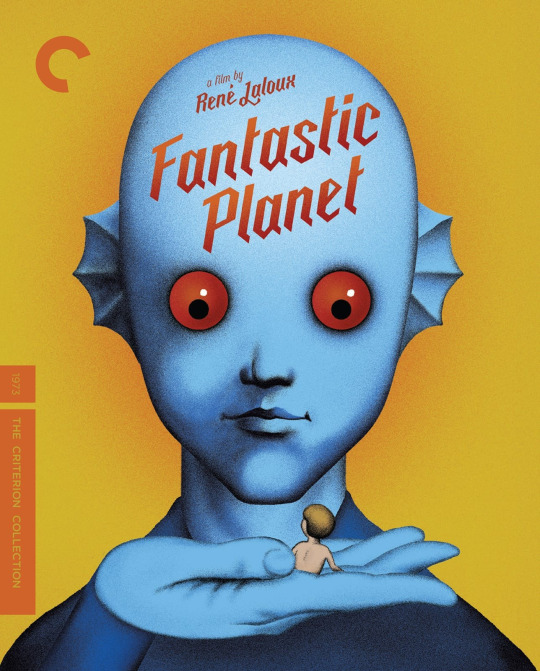
René Laloux’s La Planète Sauvage (1973), an experimental animated science fiction art film, is as strange as it is dense with implications. The politically charged dissonance of psychedelia combined with the film’s Dali-esque surreal cutout stop-motion animation universe, realized by French avant-garde artist Roland Topor, has solidified this film as a seminal work of animation and a cult science fiction feature. The film is set in the hallucinatory landscape of the planet Ygam, where gargantuan blue humanoid creatures called Draags who rule the planet enslave humans (called Oms–a play on the French homme)--Terr, an Om who has been kept as a pet since Traag children killed his mother in his infancy escapes from his child captor and bands together with a band of radical escaped Oms to resist the Draag regime and impending genocide. The film is markedly allegorical for its use of imagined alienness to establish otherness and marginalization, and the techniques the Draag use to subordinate the Oms evoke historically significant racist discriminatory practices. Simply, it feels like a movie that is bluntly about something beyond what it appears to be, and the slight heavy-handedness of its messaging reifies its goal of engaging in racial discourse.

The racial politics of Fantastic Planet are strange in that the broadness of the trenchant sociopolitical commentary imminent in the dynamic between oppressor and oppressed has led critics to draw comparisons between the plot and the narrative around “animal rights” and the (mis)treatment of domesticated animals, yet the human-ness stitched into the film’s fabric positions it as a text specifically interested in the ways humans create divisions among themselves. The Draags and the Oms, despite their vast difference in physical size, do resemble one another and take on different forms of the corporality of a human being, and for this reason and many others, Fantastic Planet seems to be a film about how we could recognize ourselves in one another and still splinter into factions and enforce senseless violent domination.
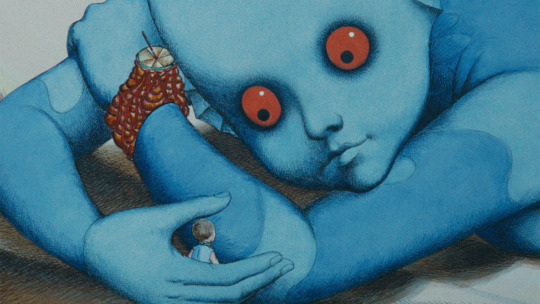
Terr’s captor, a girl named Tiwa, has given him a collar to control him as he attends “school” with her, which involves her wearing a headset that transmits facts into her brain, and a defect in his collar inadvertently allows him to learn the same knowledge as Terr, knowledge he ends up using to save the Oms. Intelligence is the gateway to capital in Ygam and the Draags are highly intellectualized beings who pride themselves on their inborn wisdom and biological superiority that allows them to far outdo the meager Oms in their knowledge–the film comments on the complications of the racialized bioessentialist understanding of knowledge that would posit that being smart, and subsequently having value, is a fixed innate biological trait. The Oms navigate the world through cunning, outwitting the Draags practically in ways they might fail to do so intellectually and the Draags and Oms counter one another in the film on what “counts” as knowledge: the Draags favor transcendental meditative practices that imbue them with highly complex perspicuity, whereas the Oms argue that their knowledge is more useful for the ways it enables them to survive despite their circumstances. The Oms are made alien not only through their physical inferiority but also because they exist in a society that was not built for them. Fantastic Planet depicts an idea of home that is stringent upon exclusivity and requires technical superiority to belong; shoring up racial politics, Fantastic Planet deploys a social constructionist standpoint that colors these divisions as the products of structural forces benefitting only those who erected them.
youtube
17 notes
·
View notes
Note
15,16,17,18,25
🔥 choose violence ask game 🔥
15. that one thing you see in fanart all the time
the ariana grande-ification of anne boleyn in fanart is truly something. and as an olive skinned white woman, i don’t think white tudor fans know what olive skin looks like. also i think there is a frankly bizarre relationship certain tudor fans have with race (ab as an Other™️ because she was supposedly swarthy, trends surrounding coa being fair and spanish, jane seymour being ‘so fair that one would call her rather pale than otherwise’).
16. you can't understand why so many people like this thing (characterization, trope, headcanon, etc)
i truly do not understand the appeal of characterising female historical figures (largely royal, aristocratic) as powerless victims — with no thought to their complicity in an inherently unjust institution. catherine of aragon (as one example) was immensely privileged to the detriment of the majority of people: she believed in this superiority as morally just and fought for it. remembering what her queenship meant should colour how we talk about her: lauding her as brave for fighting for her status can and should coexist with acknowledging what she was ultimately fighting for.
17. there should be more of this type of fic/art
i myself am guilty of this, but we absolutely need more content about non-courtiers (and content in general that is active and honest about acknowledging the fundamental value of those outside of the aristocratic sphere). wolf hall came close but veers into trying to have it both ways; ‘she [Mantel] wants to relish the bejewelled surfaces, the highly wrought fabrics, the flashing beauties of the Henrician age, while also having a go at the people and the institutions which enabled that agglomeration of riches. The aesthetic delight and the political outrage are on a collision course’. becoming elizabeth’s take on kett’s rebellion was hateful. one of the best jobs i ever had was transcribing local court records for an archive, and getting to meet dozens and dozens of men and women, and hear them talk about their lives.
18. it's absolutely criminal that the fandom has been sleeping on...
critical thinking skills 🥴
i would be remiss if i didn’t plead katherine howard’s case yet again. she’s such a force of personality — charming and delightful and ‘fired with ambition’, when i think her ability to be as successful as she was as queen, given her lack of experience and the brevity of her reign, is nothing short of remarkable. i think people are genuinely missing out on someone so engaging when they dismiss her as either whore or victim. it’s a constant frustration, for me, that the way we talk about her remains so superficial.
25. common fandom complaint that you're sick of hearing
god, i have so many of these; you could just send me 25s repeatedly atp haha. i think the most annoying thing though is the people who get weirdly offended by the insinuation that this fandom is, indeed, a fandom. there is this hypocrisy over how legitimate engagement can be — but ofc., certain people can be called ‘stans’ (indeed, ab fans can invent terms like ‘heneven eleven stans’ and ‘seyhive’, because people are just that painfully uncreative) but god forbid somebody, in turn, calls them ab stans. ‘i’m not a stan, i have a BA/BS/BE/LLB’; you write fanfiction — you are not serious people lol. it’s not an academic conference… nobody cares about you. you can leave if you’re not having fun, nobody is forcing you to be here.
12 notes
·
View notes
Text
Wrong Way to Use Healing Magic Anime Episodes 4-9 Review - Rose is a 10/10.
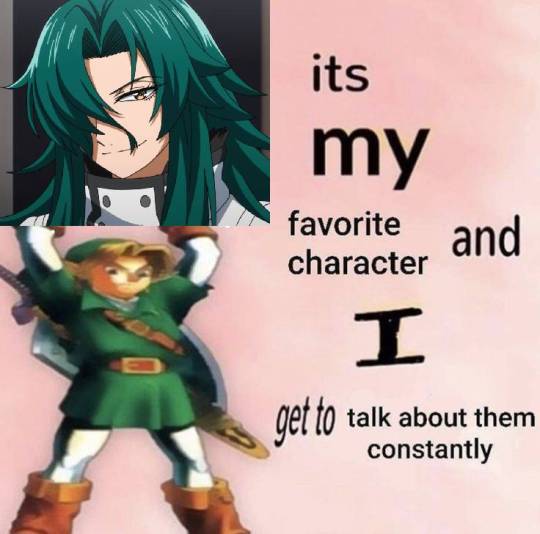
Back for another post about Wrong Way to Use Healing Magic anime, covering episodes 4-9. I’m still loving this show and wanna talk about it more without waiting until the end. Spoiler warning. I edited the image used for the thumbnail, feel free to use it fellow Rose simps.
The greatness in episode 8 and 9 is the main reason I am writing a new post now and will be the bulk of the post, but I’ll talk a bit about the earlier episodes. Watching the three main characters slowly grow and come into their own has been nice to watch. I still enjoy seeing them have slightly different outlooks while still connecting on the basis of the crazy situation they were thrust in. They all needed different amounts of time and experiences to process things and make up their mind. Hopefully we will get some more great stuff from seeing them be together again for the big battle. We got some solid new characters
I didn’t mention how I feel about the OP in the first post, I think it’s really great. The music really gets you hyped. The art is great, everyone looks awesome and has very detailed and expressive looks. I don’t have too much to say about the ED, it’s fine but nothing notable to me. It does remind you of the life Suzu had before coming here, which at least gives some relevant purpose to the visuals.

A minor gripe is that as of now I really don’t see the purpose of the future vision that Usato was shown. I don’t really feel like it changed his way of thinking or his actions. I did not feel like he was especially cocky or not taking the situation seriously, and he already had Rose instilling in him (and us as the viewer) that war is terrible and that he will be responsible for keeping people alive. Maybe there will be more to it later but I do not think this did anything for me as of now. It may have just had the purpose to drive up tension but I do not think forcing it with something dramatic like this was needed.
Now onto the highlight of the middle section of the anime, episodes 8 and 9 which cover Rose’s backstory. Hearing my favorite voice actress Konomi Kohara in episode 8 was a welcome surprise. Her voice for Aul is probably the hardest to recognize out of anything I've heard from her as the tone is very different. I immediately thought about it upon hearing her talk but was not certain until her crying when she got punched convinced me. I’d know her yelling and crying noises anywhere. Kohara excels at bringing cute, cheerful energy that immediately makes you endear for the character.
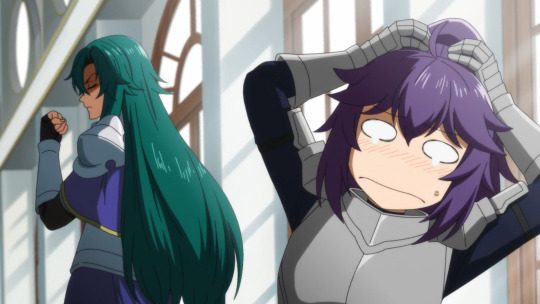
I think the time we got with Rose’s original squad was well done. It gave us enough time to let us feel the bond, but not so long that we felt we were wasting time with characters we knew would be dying. Aul is the only one who gets proper focus, but for the purpose of the unit focus on all of them was not needed. We also did get a nice moment that helped us feel that the other members were all people with names and lives. The scene where Rose talks to the parents of Josh hits hard and got me genuinely emotional. It's great for the world to have the events of that fight have an impact on more than just Rose. Hearing such a positive spin on the death of a soldier really hit hard. I hope most parents of fallen soldiers can reach the point of healthy acceptance that these two did. This scene both helps Rose and for the point of this blurb, reminds us that even though the other members like Josh did not get focus, they have some more substance than just extra soldiers.
A criticism I have seen levied was that it took too long to get the war content that it’s been building up to. It did take quite a while to get some proper action, but the action delivers. It is by no means at the top level of anime action that we have gotten in recent times, but it is good. The art is pretty great while being fun and engaging, with one of the best moments of the show being her chucking trees. There was solid pacing too, with the action not being stopped for too long by exposition. I enjoyed this fight and hope the upcoming fights are up to its caliber at least.
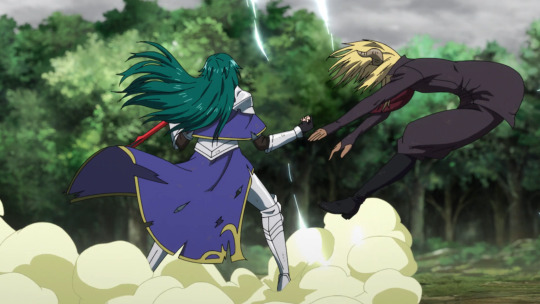
I really appreciate the show bringing up how losing her eye in the battle made a big difference in the moment. A pet peeve of mine is how often shows degrade the impact and weight of a character losing an eye. Most of the time they just keep fighting the same as normal or acclimate way too fast. I love her mentioning specifically that her depth perception is off because of losing her eye. In a proper battle that would make a massive difference. And while losing an eye only takes away about 30% of your vision, that could also mean the difference between life and death when you have arrows and magical blasts aimed at you. Characters barely changing from losing an eye sabotages dramatic weight and breaks my immersion in combat. I appreciate that this show gave her losing her eye the gravity it deserves in the moment even if it was just a bit of dialogue. Just the proper acknowledgement of the issues losing an eye brings means a lot to me.
The battle ending with the demon commander being saved is also an interesting one. They’re clearly setting up here that the demons are not meant to just be evil adversaries. It also shows the strength of Rose’s character by not having her fall into a blind rage and completely flipping as a character. Even after seeing her friends be killed, she still saw the meaning in her adversary wanting to save someone dying on the battlefield. This hits Rose at the core of who she is. Both humans and demons have people they care about and want to save. Up to this point I honestly didn’t have anything to say about the demons as they seemed like your standard demonic adversaries, but this makes me feel positive that we will get solid substance from them.
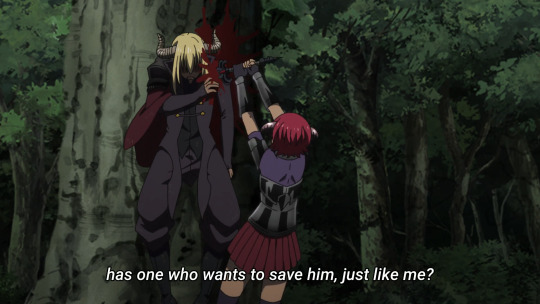
I think Rose’s fall into depression and recovery is well done. I like how we got a variety of her thoughts rather than jumping straight to a strong reaction. She did contemplate suicide, but she is engaging in self-punishment and doesn’t believe she has the right to die. But what should she do with this life? She thought about going on a demon murder rampage and getting revenge, but she already recognized that is not the right thing to do. She spent over a month stuck in her depression rather than going back so we can infer she considered quitting altogether. Another great aspect of Rose’s emotional side of things is how she gave herself the pep talk based on her memories, rather than getting a stereotypical pep talk from someone else. It’s important to show how support from others is important for emotional processing, but getting over every emotional hump doesn’t come from someone telling you how great you are, and sometimes you do need to work through things yourself internally. The king and other knight checking up on her likely helped but this is clearly not written the same as a pep talk. Sometimes people can work through things on their own with enough time to process. And this isn’t from negative behavior like her not accepting help or having a bloated ego. The problem was all internal and there is no way anyone else could have properly related to her as no one else has the capabilities she does. I love that it took a long time for her to reach this. It’s important to note how long it takes to cope with your emotions. And to return to the pep talk point, sometimes those pep talks that make a person’s emotional state do a complete 180 make it seem like overcoming bad emotions is easy. I really like her growth comes from her thinking about their lives rather than about their deaths. It’s obvious that after a horrific event like she experienced, she would hyperfixate on their deaths. She already had the answer as Aul was dying, that she should not hate herself and to continue being the strong and kind person she is.
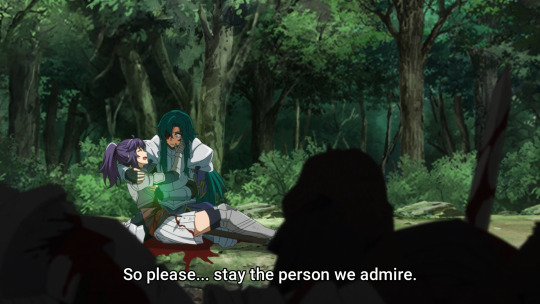
She was also told by Josh's parents that she should not be ashamed of herself and what she has done. But the severity of the moment muted the positive impact of those words. When she is able to think about what came before that terrible event, she realizes the proper way to think. By remembering what her squad said while they were alive, she was able to put her own life into perspective and find a goal. Knowing everything that happens, it feels like a logical conclusion for Rose to focus entirely on saving lives. As a character within the archetype of the tough brutal teacher, Rose feels far above the rest as a dynamic and fleshed out character who does not exist just to be hated. She does the usual drill sergeant type of thing while having proper motivation and emotional reasoning behind it. She’s not brutal just so the main character has to struggle, she is brutal because of her backstory that stands entirely on its own. Rose really is a fantastic character by all metrics and she alone makes this show worth the watch.
This show continues to have great characters and excellent execution. We did have to wait a little too long for some great action with overall slow pacing, but it was still enjoyable, and I see some value in the slow buildup. The buildup was very successful for Rose’s side of things, so I feel confident that the buildup will have been worth it for Usato’s side as well. Hopefully this anime will continue on strong through to its conclusion. Thanks for reading!
#anime#review#blog#winter 2024 anime#the wrong way to use healing magic#Chiyu Mahou no Machigatta Tsukaikata
14 notes
·
View notes
Text

The Art of Defiance - Chapter 6
Part 2 of a Clexa Star Wars AU
While their hunt for Roan has at last yielded results, nothing can be taken for granted where Dark Jedi are concerned. They walked into a trap the last time they found him; what's waiting for them this time?
"So is there anything I should look out for?" Bellamy asks, drawing both Clarke and Lexa's attention. "Is he gonna. Try to blow up my brain, or something? I've never fought a Jedi before." And Lexa, who is still waging the fight to keep her righteously irritated comment under control, answers flatly, "He isn't a Jedi." "Right, because that answers the question," Clarke intones. Lexa doesn't need to see her expression to hear the sarcasm in her voice. "He's not a Jedi, just has all the same superpowers and some extra evil ancient artifacts besides. A helpful distinction." There is no passion, she reminds herself as she accepts this not unwarranted, if frustratingly phrased, criticism and says, "There is a possibility he has a lightsaber. If he does, beware firing at him; he will be able to deflect blaster bolts, potentially directly back at the hand that fired them." Lexa does not need Force sensitivity to feel the wordless exchange between Clarke and Bellamy. They are familiar enough with each other that they can, it seems, communicate silently with some effectiveness. "Well that does limit our options a bit," Bellamy says, confirming Lexa's suspicion. "Please," Clarke snorts and flicks at the armor covering Bellamy's shoulder for emphasis, "you're a tank. He'd need a cannon to get through this. Just don't get hit in the noggin." "You won't need to engage him directly," Lexa answers, suddenly wishing she and Helena had traded places. "If and when we find him, Helena and I can do the bulk of the fighting. We will need you, Octavia, and Lincoln to provide cover fire, or to target any security measures and personnel he has with him. "He is also trained in the use of the Force," she continues before any other smart comments can be made. "Do not allow him to catch you by surprise. It may be the difference between having your blaster pulled from your hands or keeping your feet." "Don't shoot at him, don't get shot, don't get taken by surprise--" Clarke's words are cut off by a jarring shudder of the lift as it finally comes to a halt. "I'm feeling more useful by the second." Lexa moves in front of the doors. For all that Clarke is being... unhelpful at the moment, she isn't wrong. Lexa knows first hand the disparity between a Force-user with Jedi training and the average hired gun. "Just..." she says, not quite looking over her shoulder at either of them. What advice could she possibly give? Defending against offensive Force techniques and lightsaber forms takes years to learn, and they have thirty seconds, at best. With anxiety solidifying into something like sorrow in her chest, she says, "Stay alive." And when the lift doors open, she steps into a cave so cold her breath fogs before her.
Read on Ao3.
#clexa#clexa fanfic#the 100#the 100 fanfic#clarke griffin#commander lexa#lexa woods#star wars au#SWAU#my fic
16 notes
·
View notes
Text
Gonna say something that'll make CERTAIN HoTD fans upset, but fuck it
Putting aside targaryen incest which is already a mess to talk about but ultimately something that must be accepted for the sake of story' narrative and is even criticized within the story due to power imbalance and story of breaking tbe cycle
, why do yall get angry when people who actually commit acts of of pedophilia or incest enjoy your works whether it be art or fanfics...of incest and pedophilia?
Like you wrote Otto FULLY enjoying fucking Alicent pre-dance as a teen and even will have her enjoying it. Like sure you saying "oh but I don't condone or support this abuse in any shape or way!" Yes yes that's why you made a purple prose erotica of Alicent rubbing her feet on Aemonds cock.
And before you say "Well normal people can separate fiction from reality!" We're not even going to go down that tired and worn argument when both know you don't actually care about it (I swear it's easier deal with pro-natalists/forced birth supporters who are obsessed with religion than yall)
Point is, you have made ZERO attempts to actual show or prove you genuinely do not support or endorse incest or pedophilia aside from a string of words that can be edited out if needed or simple be hand waved and skipped over
You want actual offending sex offenders, incestuous people, and the likes to stop engaging with your incest fics? Drop a few posts and links from survivors, donations links, or better yet actual organizations that press to charge those who commit the acts, and it ain't even that hard. If providing information against abuse is hard, but writing a 15 year old giving a handy to someone 30+ is easier for you....
But if not? Then stop bitching when anonymous user 1488 brags about fantasizing himself and his work buddy fucking his own daughter the same way you wrote Rhaenyra going down on her father and Otto at the same time
#house targaryen#house of the dragon#tw inc*st#tw pedophila mention#tw: sa#i don't even want to call this discourse
6 notes
·
View notes
Note
I'm looking forward to your reviews on their individual albums/music etc
Okay, I will tell you as long as everyone promises to be nice!
First, I want to be upfront with the fact that I do not have the technical knowledge required to critique their individual singing or songwriting skills in depth, so this is not that kind of review. However, I believe that people should actively engage with art, be it music, painting, or writing, at whatever level of expertise they may have, rather than consume it mindlessly. The following are my personal opinions and observations as a fan since 2015. I will focus mainly on their Chapter Two individual works, but I will also reference their previous solo and group work. And as a friendly reminder, the members of BTS are not above criticism as artists or as people.
"Indigo" by RM
If I had to use one word to describe this album, I would use "growth." More specifically, I would classify the transition from "RM" to "mono." as linear growth, and the transition from "mono." to "Indigo" as exponential growth. This is a project that Namjoon worked on for several years, which is apparent by the way each song is like a chapter of the same overarching story. The diverse genres and moods depict the ups and downs of life really well, and listening to the entire album in one sitting is a cathartic experience for me.
When I first saw the tracklist and noticed how many other artists were featured, I was nervous because a lot of BTS' collaborations feel like forcing a puzzle piece into a spot where it doesn't fit. What I mean by that is, they either cut out a chunk of the original song or insert a blank space and then fill it with a clipping of what sounds like an entirely different song. A substitution rather than a collaboration, if you will. However, that was not the case here. I think Namjoon did an excellent job of blending his own sound, style, and emotion with that of the other artists.
The only thing that I actively disliked on this album is the beat in "Change pt.2" from about 0:49 to 1:00. It's grating on the ear, which might have been intentional given the content of the song, but it isn't pleasant to listen to, and I cringe every time I hear it. As for a favorite, I can't really choose, but I think the objective number of replays would point to "Lonely."
"The Astronaut" by Jin
This one is an outlier because it's only one song, but I will discuss it just the same. I really liked Seokjin's voice in this one. I don't know the official terms, but it's lower and less breathy than usual. To me, that makes his voice sound warmer. Overall, this was a soothing song that left me wanting more when he gets back. I am waiting (im)patiently.
P.S. I know people tend to love or hate Coldplay. I don't listen to them or know anything about them as people, so the fact that this was cowritten by them doesn't really factor into my opinion of the song, if that makes sense.
"D-DAY" by Agust D
The amount of money I spent to see him live in Chicago should tell you how much I liked this album. Similar to what I said about Namjoon above, there's tangible growth from his mixtapes "Agust D" and "D-2" to his studio album "D-DAY." It's to be expected that experience will improve the craft, of course, but I still have to say it.
Yoongi is my favorite composer of BTS, by far. "Interlude: Dawn" and "Snooze" give me goosebumps every time I listen time them. Also, I love it when he uses traditional instruments like the haegeum. There's just something about the emotions he conveys in his tone, lyrics and melody that made this album a nonstop repeat for me.
My complaints are few and small. The autotune gets to be too much in the song "D-Day," and I'm not crazy about "People Pt. 2." Personally, I am not a fan of IU's voice. I have nothing against her, by any means, and I know she can sing, but I prefer women with deep, husky voices. And for the life of me, I can't figure out what her part means. I'm guessing this was a direct translation from Korean that didn't really...well, translate.
"Jack in the Box" by j-hope
When I first watched the MV for "More," I stimmed for joy. I was rocking, flapping, and squealing. I braved Lollapalooza as an autistic person, surrounded by a hundred thousand people in the summer heat, wearing the denim jacket I painted and an N95 mask to hear this man live. Hoseok's personality shone through in the concept, the MVs, the music, and the lyrics. He burst out of the box to show who he is as an artist. Perhaps I am (Hobi-)biased, but I don't have much else to say other than that I love this album, and I'm excited to hear more from him in the future.
"FACE" by Jimin
"Set Me Free Pt. 2" was the first single that was released, and it thoroughly crushed my hopes for the rest of the mini album. Though I liked the melody of the chorus, the 9 repetitions of "set me free-e-e" left a lot to be desired lyrically. I think he was trying to portray the desperation he felt by repeating the phrase, but his voice didn't show a progression in emotion as he continued through the chorus. For comparison, in Rage Against the Machine's "Killing in the Name Of," the last line "fuck you, I won't do what you tell me" is repeated 16 times, but the way it starts as a murmur and builds up to a scream is powerful; it hits you in the chest. "Set Me Free Pt. 2" didn't have that effect. Also, the autotune in the middle when he "raps" is awful. I saw people on here reaching to explain why the autotune wasn't actually that bad, but...it just doesn't sound good. And him saying "fuck all your opps"? Yikes.
The other single "Like Crazy" was much better and more in line with what I was expecting. Rarely do I like any of the excessive remixes they put out, but the deep house one is actually good. I liked the music video, too. But unfortunately, the mud on his hand after all that bathroom imagery was a...shitty decision. Overall, I don't go out of my way to listen to any of the songs but "Like Crazy" and "Letter," which is my favorite.
"Layo(v)er" by V
I was underwhelmed by this mini album. I expected R&B and jazz from him, and I think his voice suits those genres well, but none of the songs had a particularly strong impact on me. I would say I like "Love Me Again" the most, but it doesn't even compare to "Singularity" and "Stigma" for me. I have to be in a specific mood to listen to slow music in general, so the odds were stacked against this album from the beginning.
"Golden" by Jung Kook
This album was the biggest disappointment I have ever felt as a fan. Honestly, I didn't think it could get any worse than "Permission to Dance," but I was wrong. Before I continue, I feel like I need to offer some context on my general opinion of BTS' music from 2020 onward before I get too deep into the weeds. So let me start with that.
A lot of people think BTS peaked before or during the "Wings" era and sold out with the release of "DNA." I am not one of those people. Most of my favorite BTS songs come from the "Love Yourself" and the "Map of the Soul" eras. There are songs that tug on my heartstrings, songs that give me energy, and songs that are inextricably tied to certain memories from college and my first job. This was when I felt like I was changing and growing in a positive way thanks to BTS' message and music.
That changed with Covid-19. I loved "Map of the Soul: 7" and had tickets to see BTS in Chicago, but then the concert was postponed. Later, it was canceled. Half a year into the pandemic, BTS released "Dynamite" as a fun summer song to lift everyone's spirits. It was their first all-English song, which might've had more global appeal due to the number of people who speak English as a first language, second language, or lingua franca. Personally, I don't hate "Dynamite," but I do hate what it led to.
This was their first Billboard #1. It succeeded far beyond anyone's expectations, and I was proud of them for that. I was glad that more people were checking out their music because BTS is one of my main special interests. However, a lot of what followed felt like an attempt to recreate the success of "Dynamite" rather than an effort to grow as artists. Whether that desire for numbers came from the company or from BTS themselves, I'll never know. All I can say is, I'm glad DynaButterPTD did not get a Grammy. Let's continue.
"BE" came next, and if I had to describe it in a word, I would say "homemade." BTS were more involved in this album than any other, including the concept, the album design, the photoshoots, the music video, and the songs. Because of that, the overall vibe was different, and combined with the effects of the pandemic, the album gave me the feeling that the members of BTS were struggling with who they were as a group, as artists, and as people.
This continued into "Butter" and "PTD," two more all-English songs, and various collaborations of the puzzle-piece-that-doesn't-fit variety I mentioned above. It was an identity crisis. I can't think of another way to describe it. Eventually, BTS decided for themselves that they had to take a step back, spend some time alone, and regroup later. I was both sad and relieved to hear the news. Releasing "PROOF" was a good way to look back on what they'd accomplished so far and put an end to Chapter 1.
That brings us to Chapter 2. More specifically, "Golden." Now, I love Jungkook. Spend 5 minutes scrolling through my blog, and that much will be obvious. But this album was not it for me. First, I want to make it clear that the members of BTS can sing in whatever language they so choose. Having said that, I do tend to prefer their songs that are entirely in Korean or are a mixture of Korean and English. Why? Emotion.
BTS' all-English songs tend to be written by other people, and those people tend to be the ones who write the same bland, unoriginal songs for overrated American/Canadian/British pop singers. Although Jungkook sings the English lyrics of this album with excellent pronunciation and technique, it doesn't have the magnitude of emotion in songs that he participated in writing, such as "Your Eyes Tell," which is in Japanese and English.
I don't know a lot about song credits, but I've noticed the following pattern: the more the members' names show up in the credits, the more I like the song. Looking at the credits for Golden? Jungkook's name isn't listed on a single song. That isn't necessarily a bad thing. A lot of wonderful singers all around the world can take a song that is given to them and make it their own by contributing their own talent, their own voice. But frankly, Jungkook didn't do that with these songs. I didn't want to say it, but...these are Justin Bieber songs. Especially "Too Sad to Dance," which is nearly indistinguishable from Justin Bieber's "Love Yourself."
On episode 21 of Suchwita, Jungkook said he recorded five songs in a week, which amounted to one song per day in a 3-hour session, give or take. Yoongi said that was a sign of unbelievable growth, and for comparison, Taehyung said it takes him 3 days to record one song. If I remember correctly, Namjoon worked on "Indigo" for 3 years. So, it's really no wonder why this album is the music equivalent of fast fashion.
I've already talked about how much I hated "Seven" (the song and the MV) in other posts, I can't do it again. Jack Harlow's part in "3D" makes me gag. I can't take the lyrics for "Shotglass of Tears" seriously. I mean, "she the life of the party...42 in her body...tell me, am I ever gon' feel again?" Yikes! "Closer" is generic runway music. "Yes or No" is tolerable. The only song I really liked is "Standing Next to You." I'm just disappointed. I don't have anything else to say.
6 notes
·
View notes